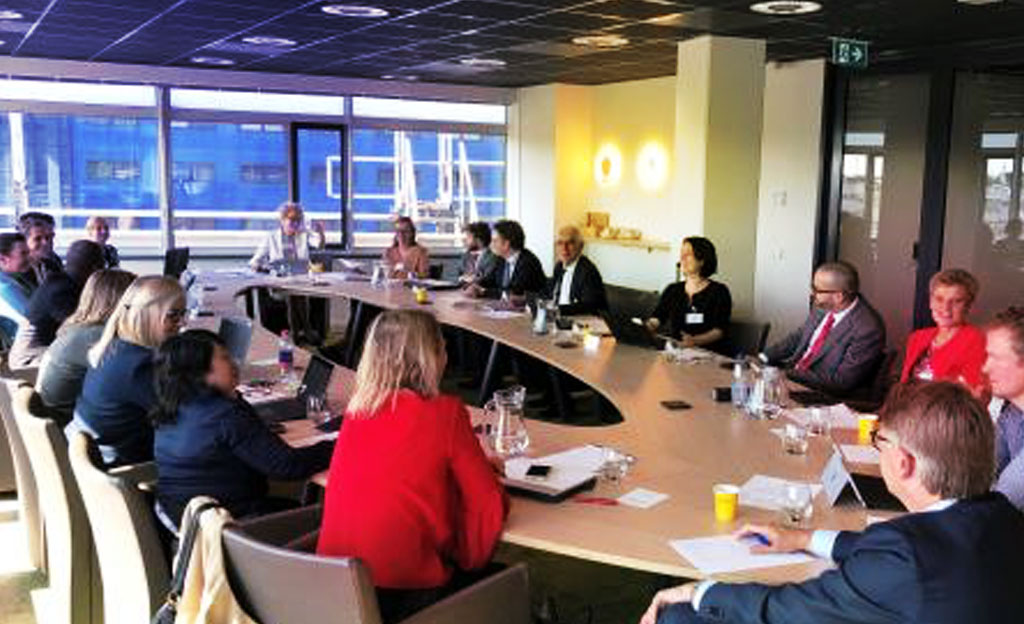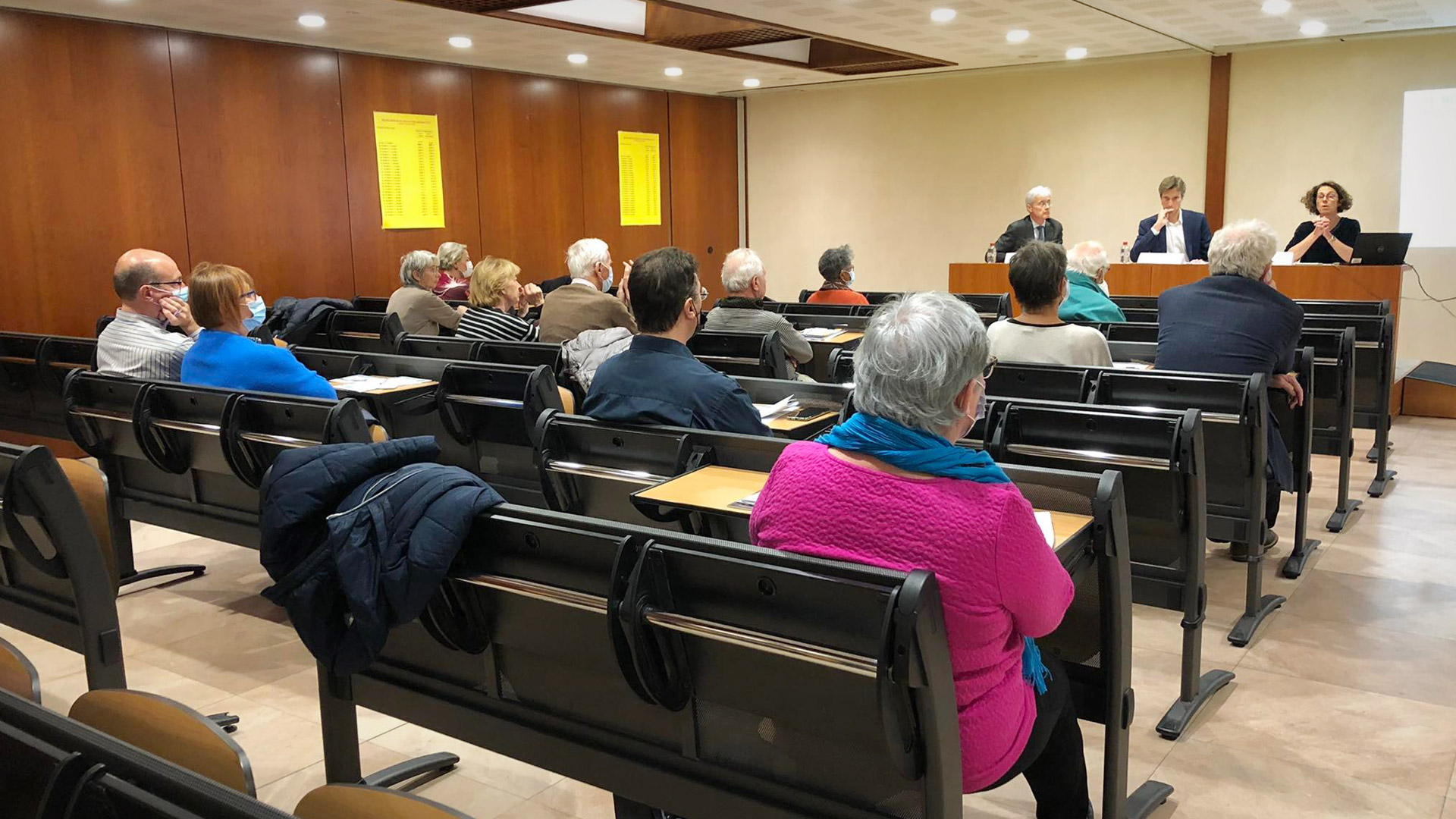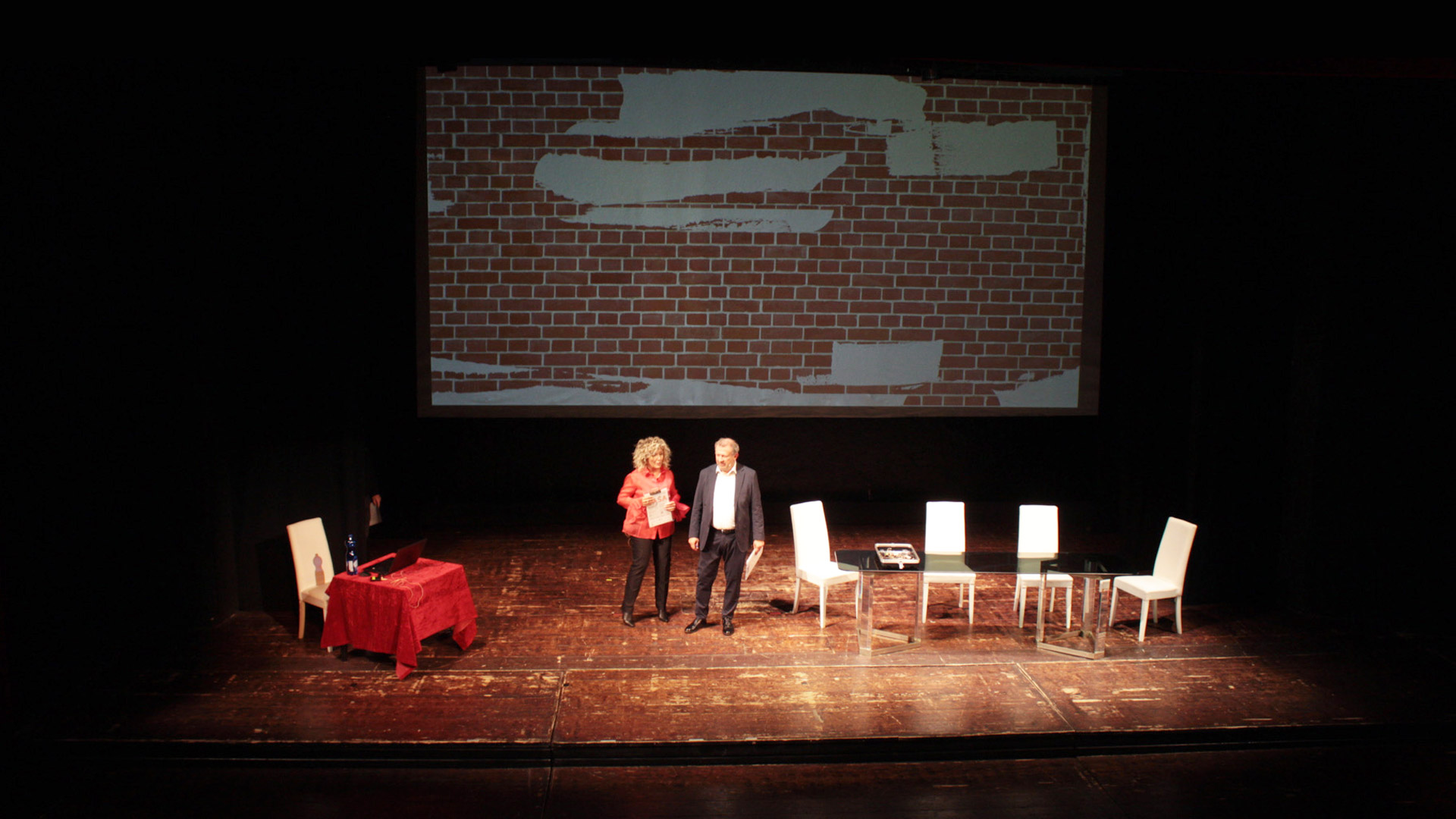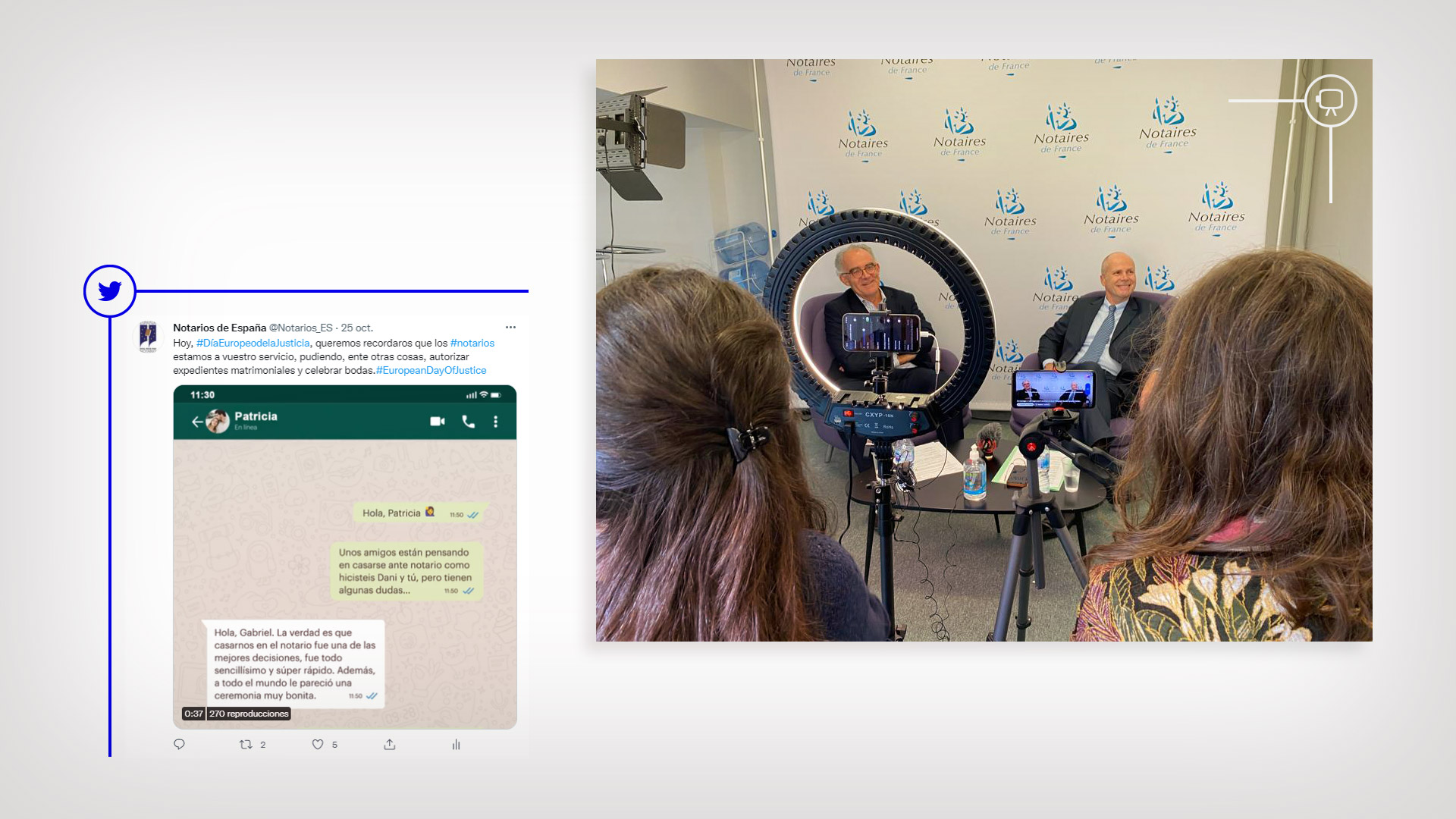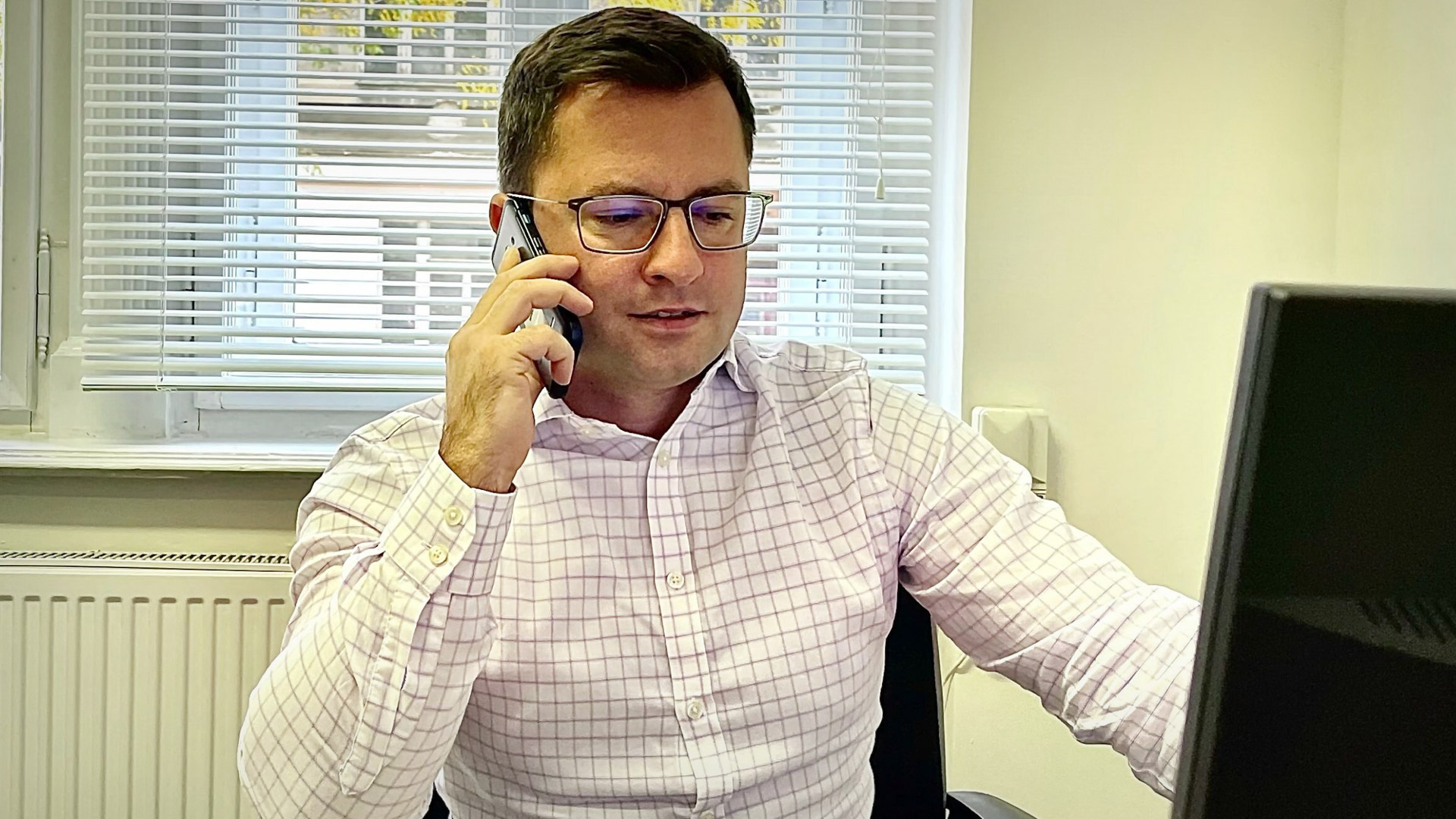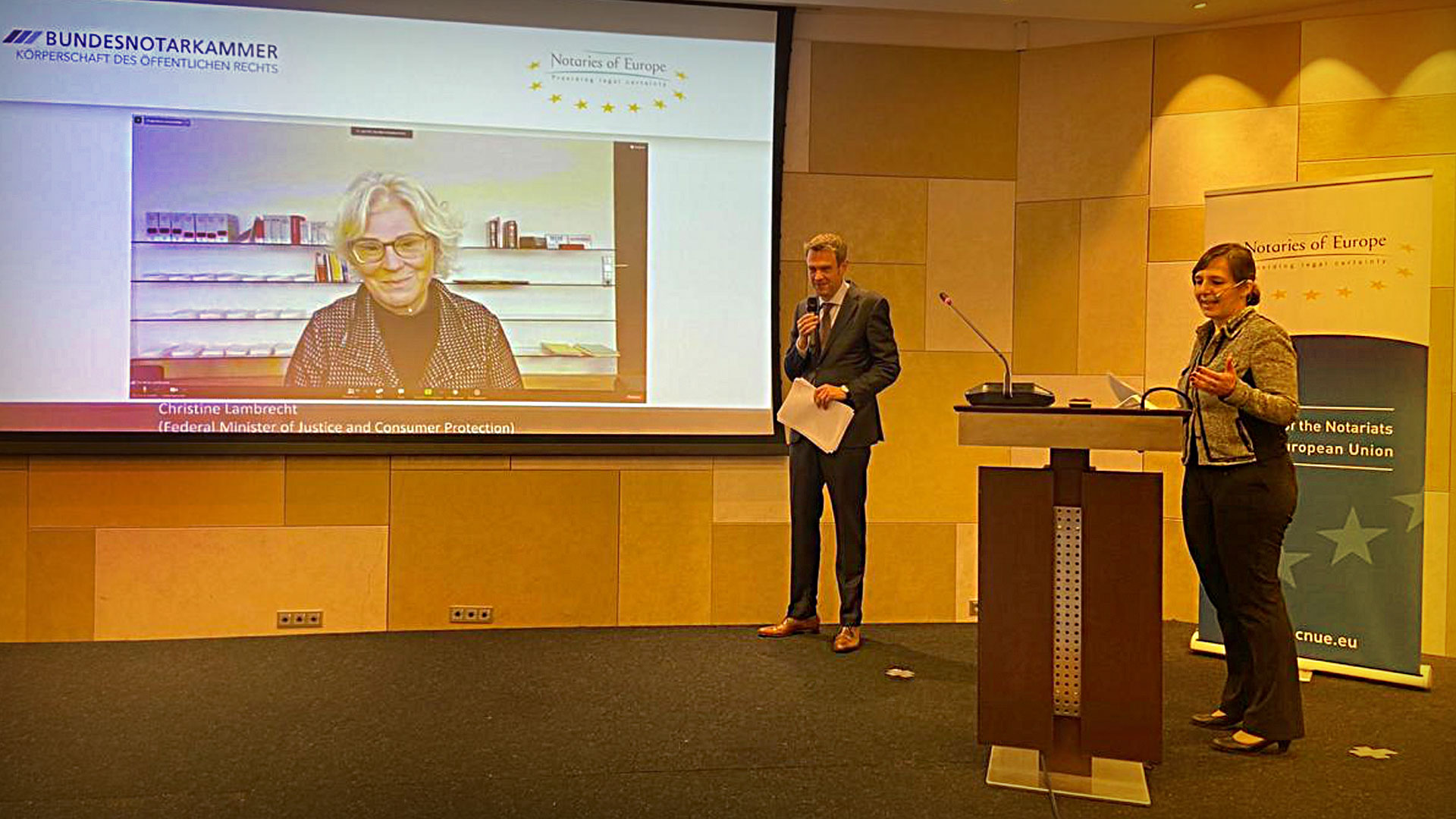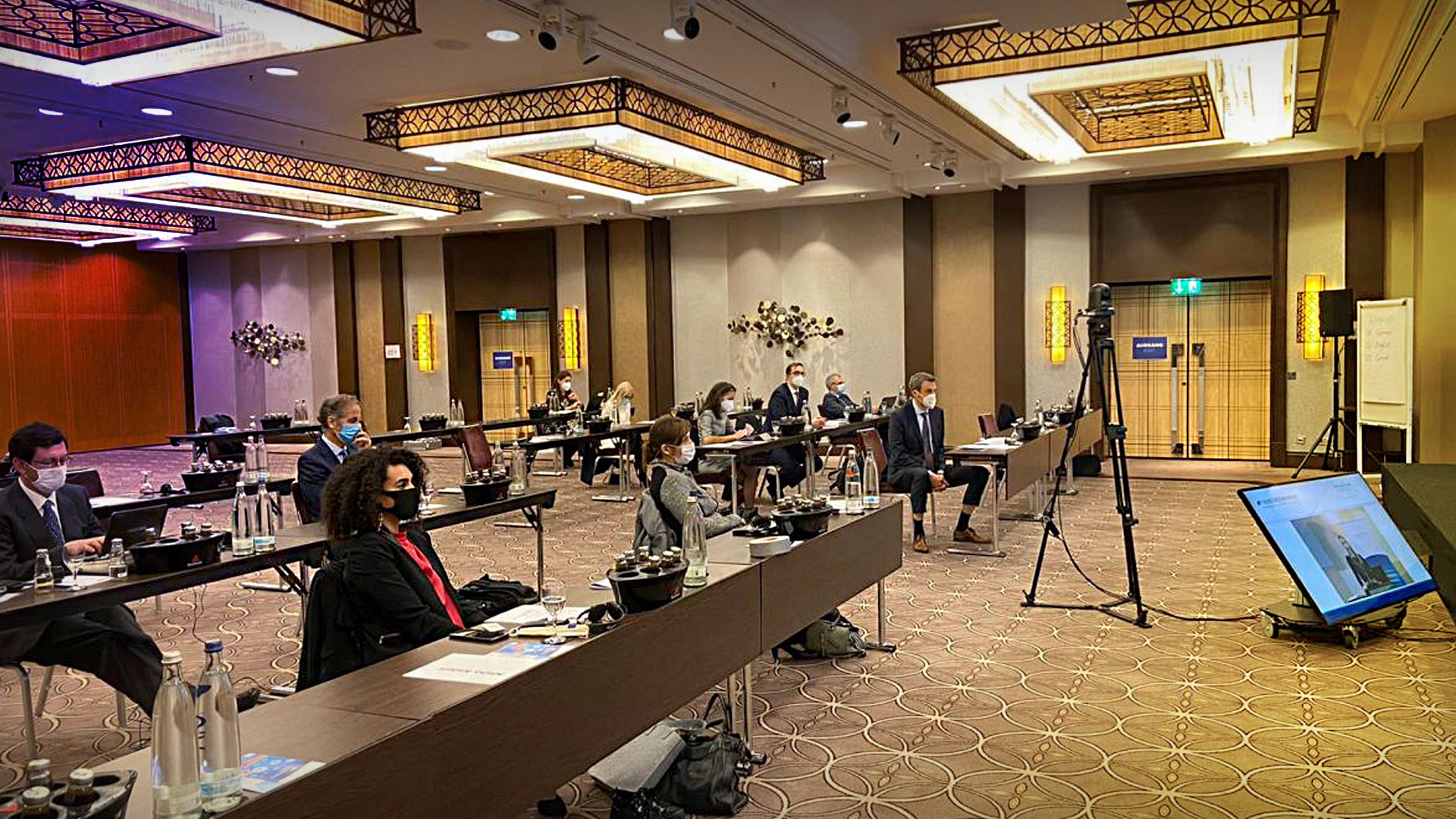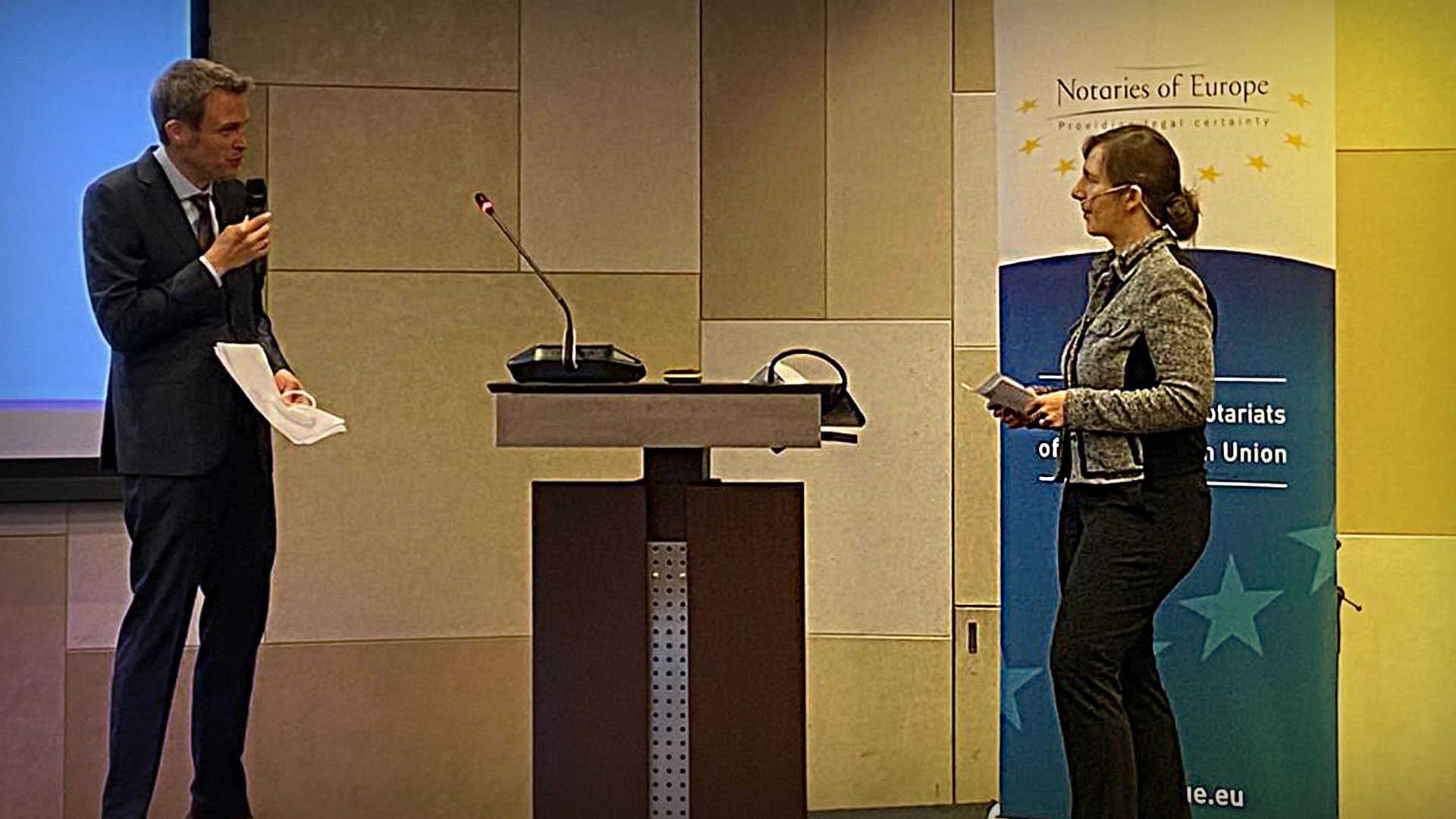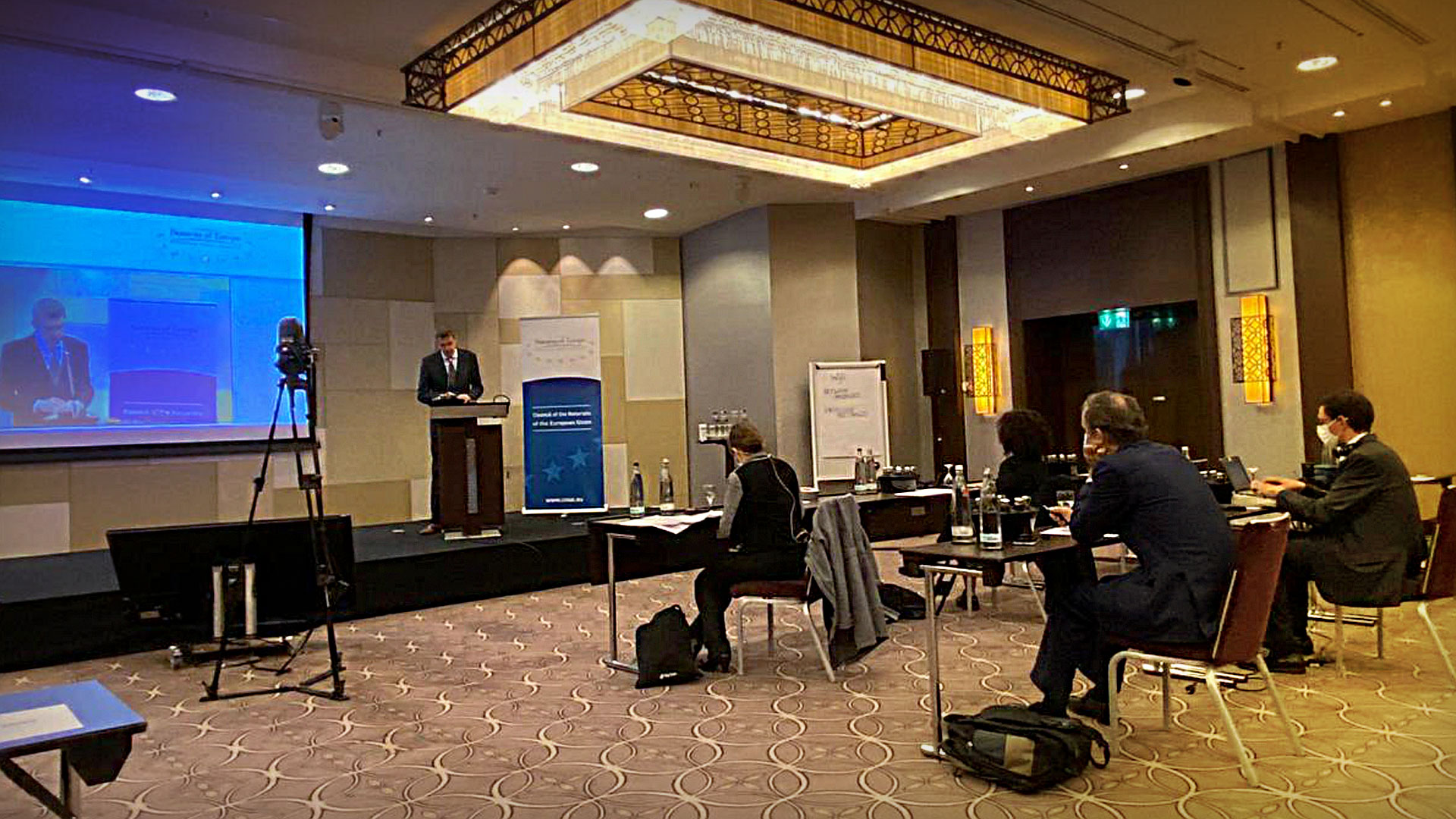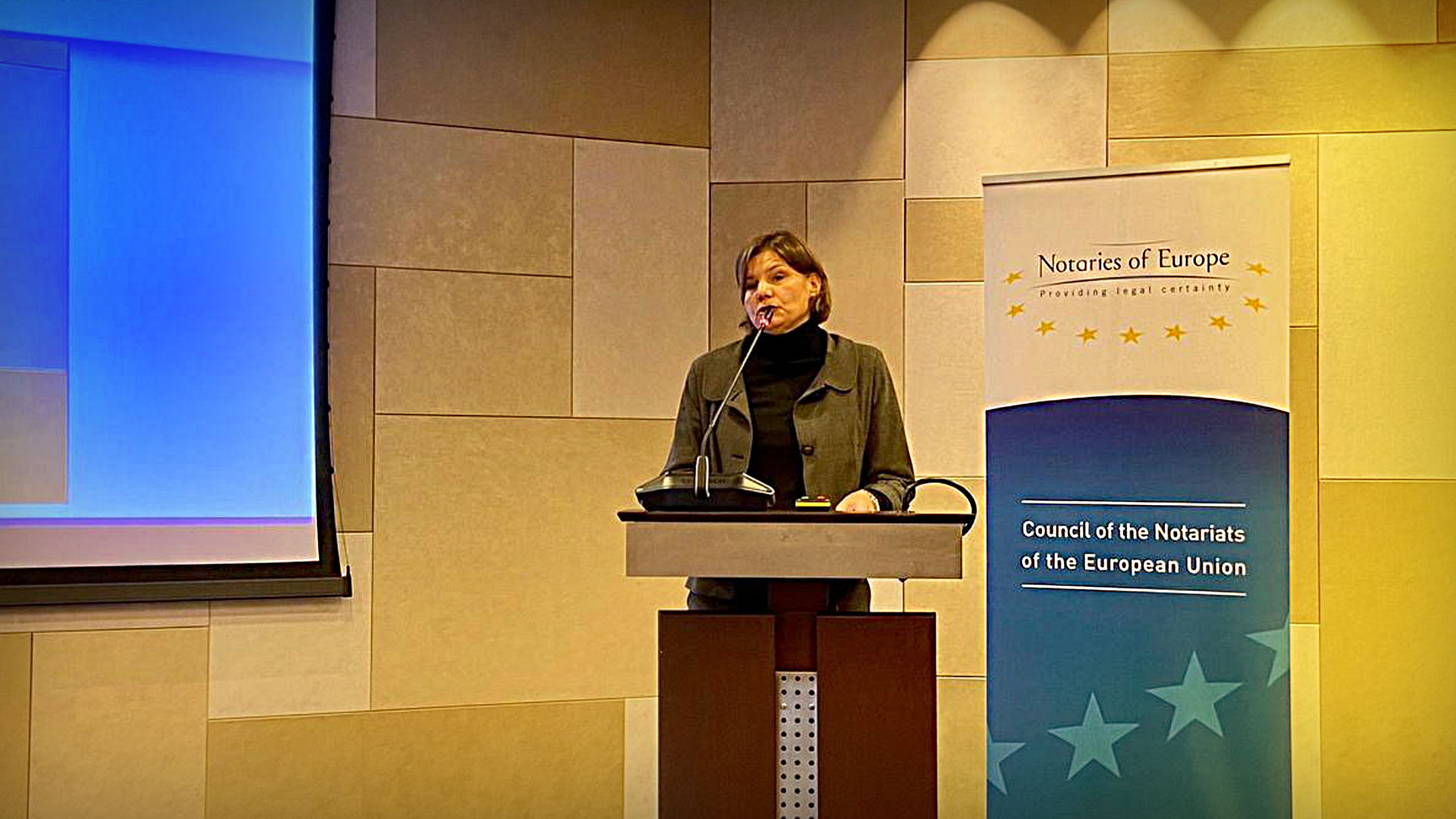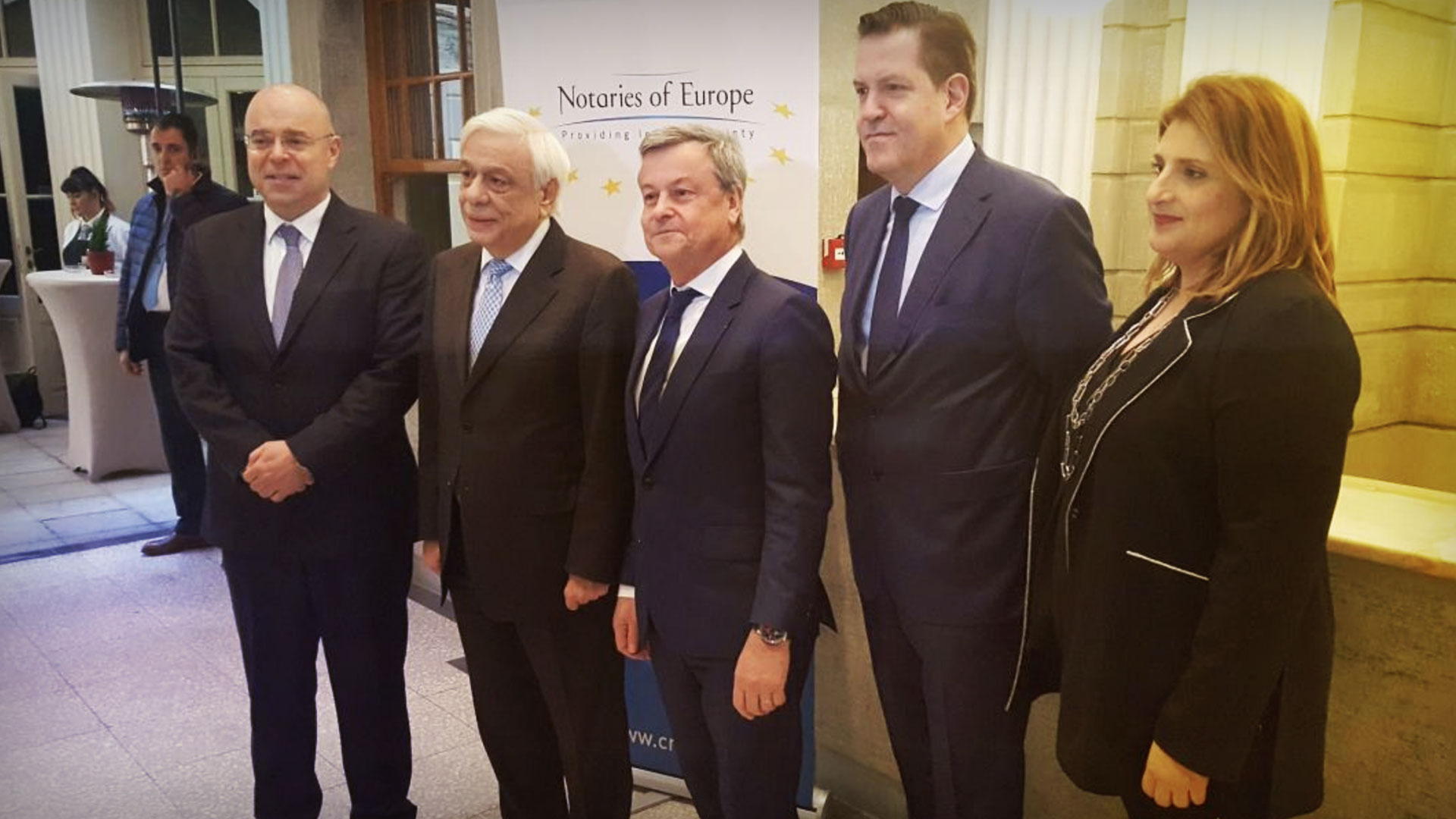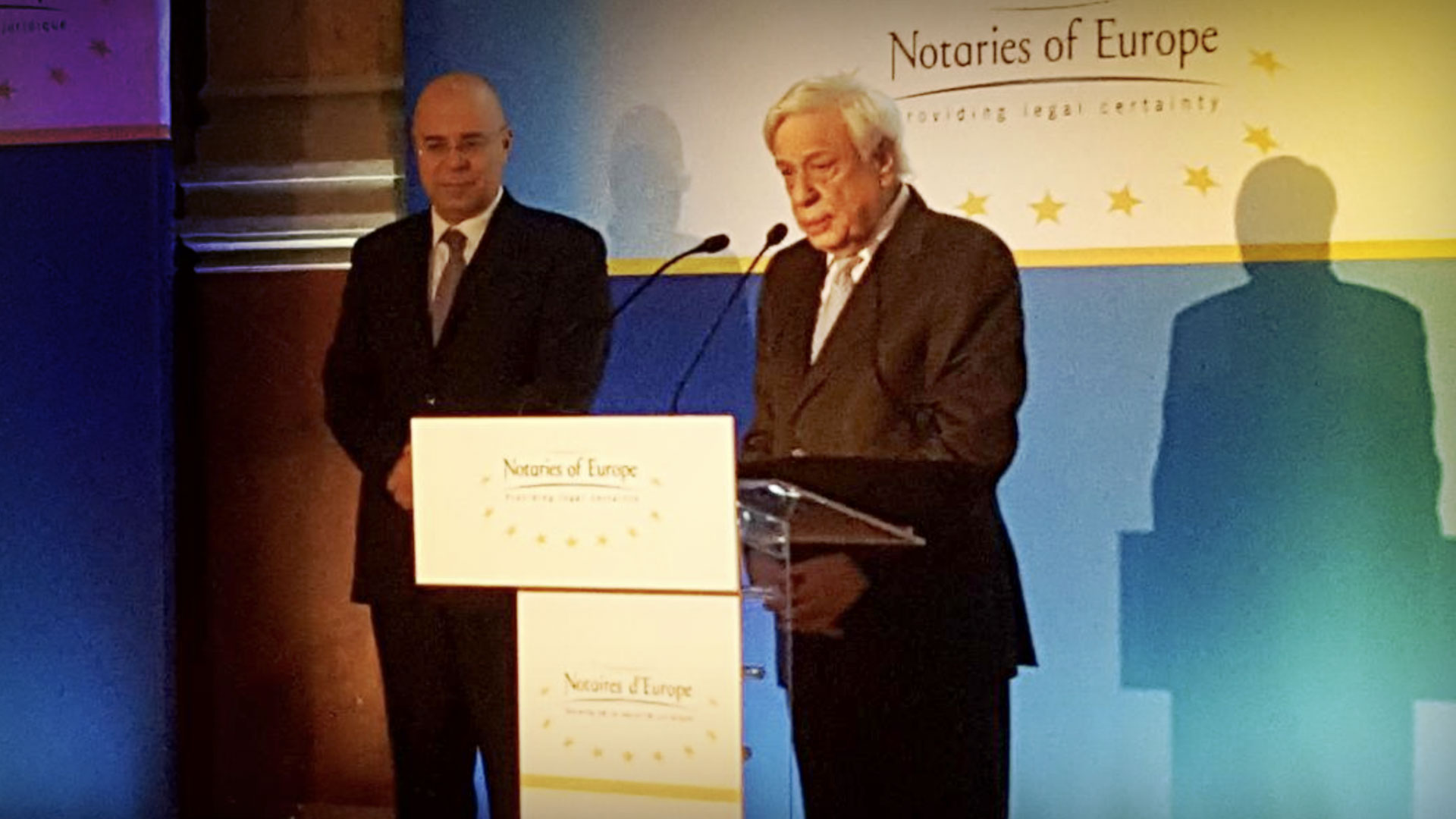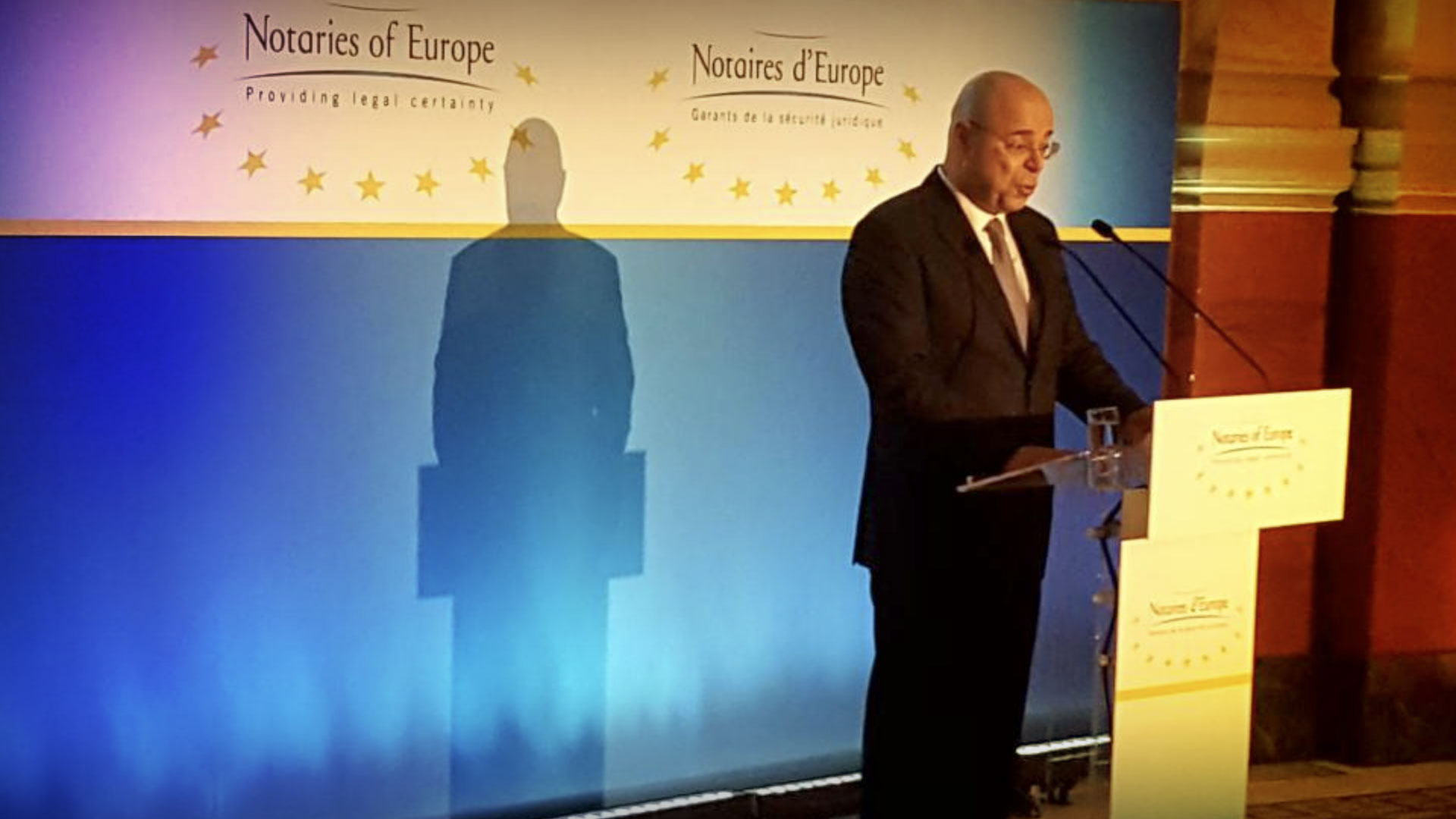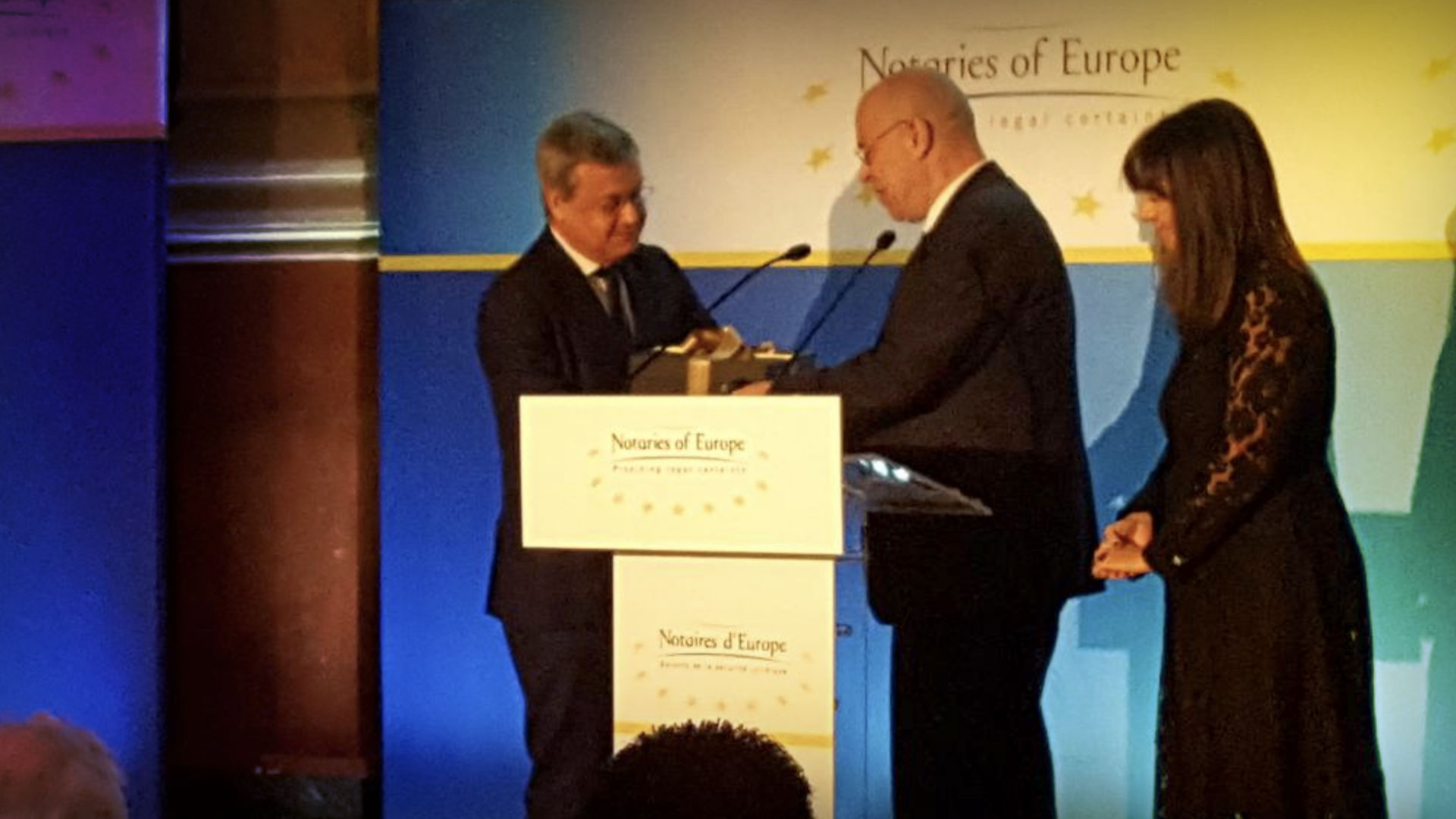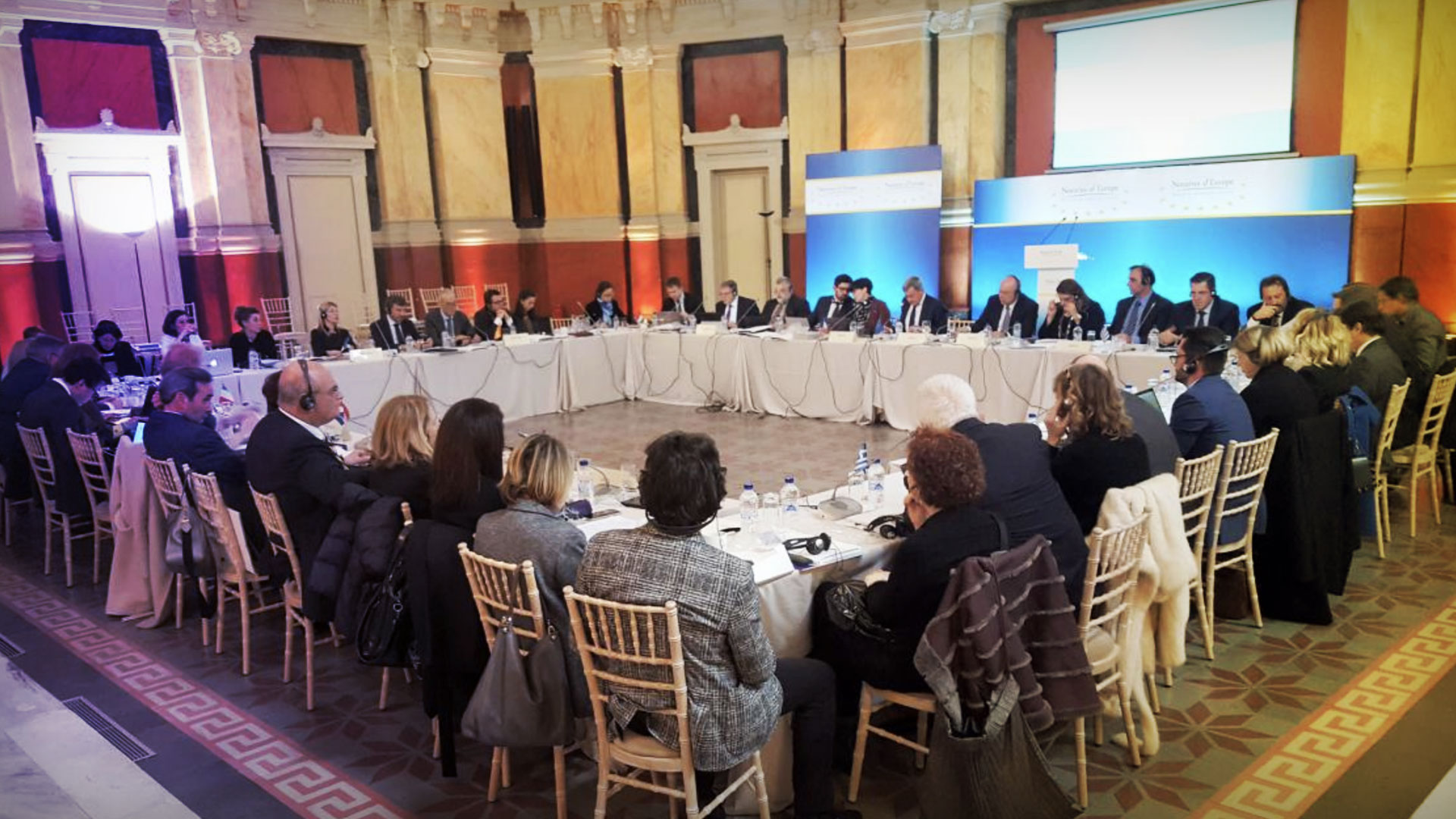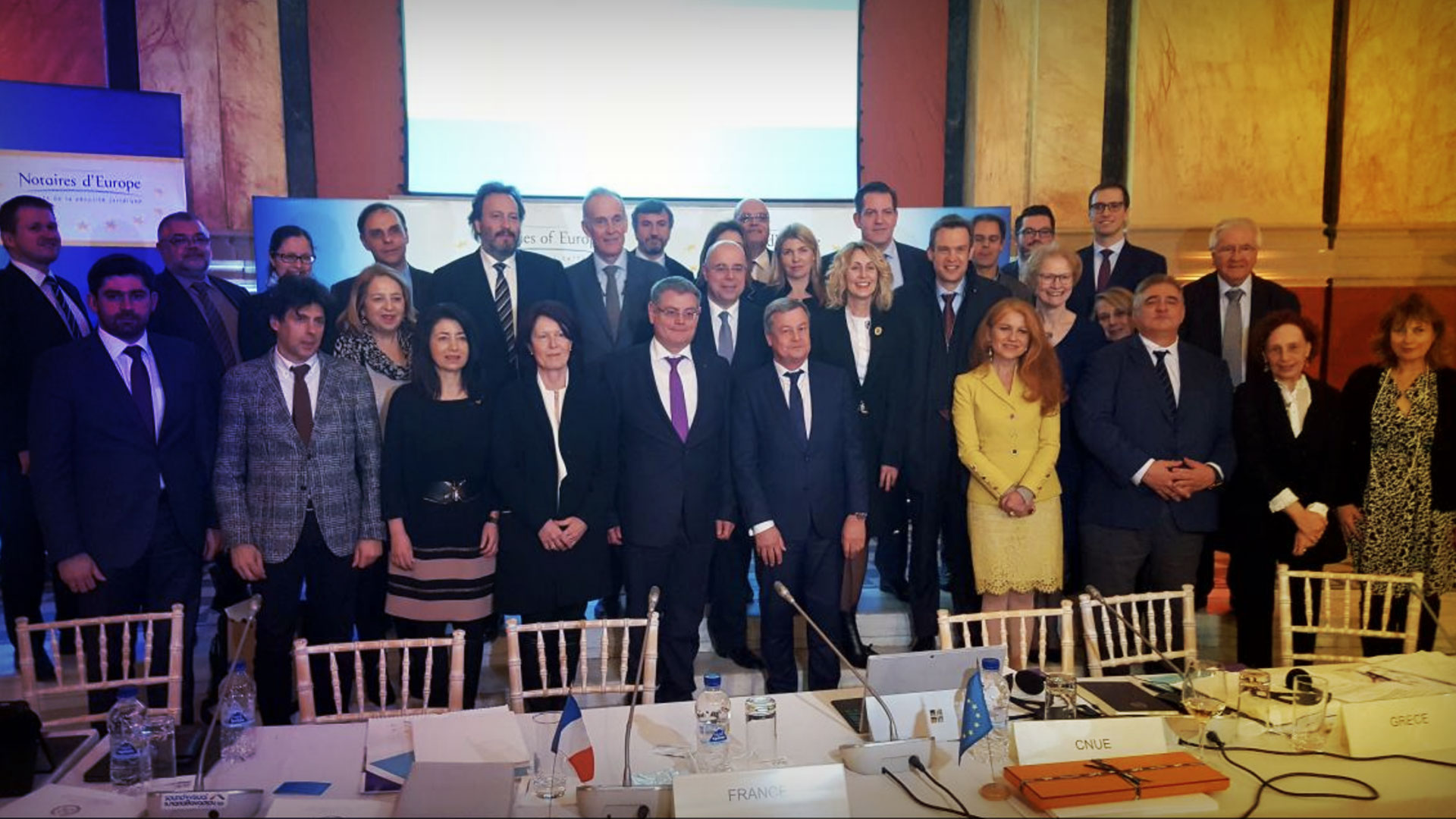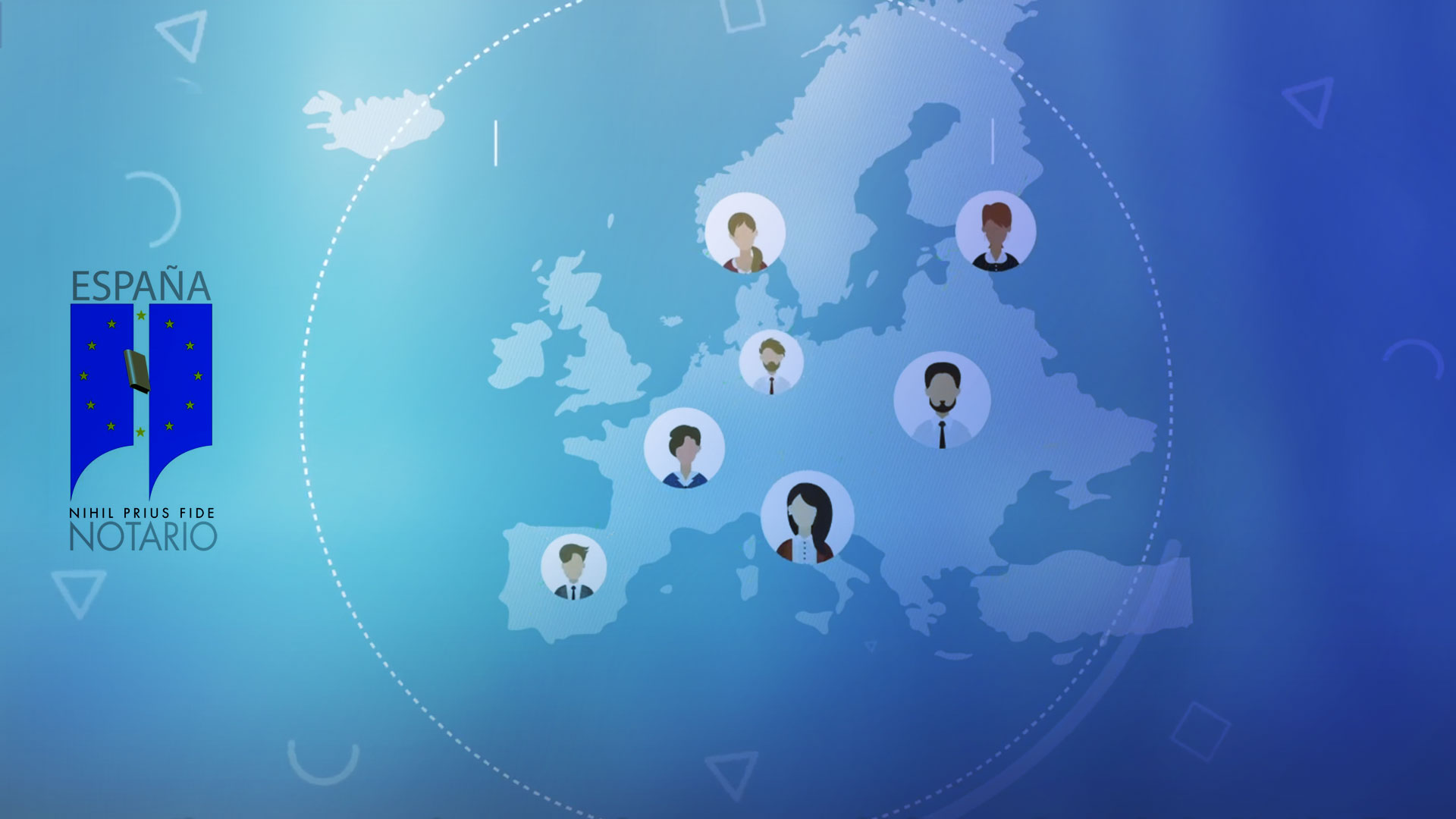News CNUE, 29 October 2021
6th edition of the Notaries of Europe Open Days
–
On 25 October 2021, within the framework of the European Day of Justice, the notaries of Europe organised the 6th edition of their open days. In 11 countries, information sessions, didactic conferences and free consultations attracted several thousand people, whether they were ordinary citizens, students, retirees or entrepreneurs. They had the opportunity to get information, ask questions about their family and property situation or learn more about the role of the notary and the European and national institutions.
Thus, in Romania, the National Union of Notaries Public and the different regional chambers held consultations, either at the headquarters of the chambers, or through the Zoom platform, or by e-mail or telephone. The topics discussed during the consultations were: the notarial succession procedure, divorce by mutual consent, authentication of documents and legalisation of copies.
In France, a Facebook live was organised with the magazine Challenge. Participants were able to ask questions as diverse as:
> How to make a success of expatriation within the European Union?
> How to buy a property in Europe?
> How to get married in Europe?
> How to prepare for retirement in Europe?
In Spain, a social network campaign was set up to explain how notaries can help citizens in important moments such as buying a house, setting up a business in another EU country or celebrating a wedding.
In Belgium, in the French-speaking part of the country, conferences were held for the general public on the theme “Plan, organise and declare an estate: be informed”. In the Dutch-speaking part of the country, a Facebook live was organised on the subject of successions and donations.
In Croatia, the Croatian notariat decided to dedicate this edition to the theme of legal prevention and the role of notaries in legal security. In this sense, they named this year’s topic “Prevention is better than cure” (in Croatian “Bolje spriječiti nego liječiti”). They prepared a series of informative texts and short videos, published on the Chamber’s Facebook page. They have also prepared a small leaflet on this year’s topic, which will be distributed to clients in notarial offices.
In Italy, the National Council of Notaries and consumer associations held the event “Perché non sia una casa di carta” (Why it is not a paper house) in live streaming > Discover the streaming from Teatro Ghione in Rome. During the afternoon, six updated guides dedicated to the world of housing (Buying under construction, Advance guarantee, Price-value, Auctions, Certified purchase, Informed mortgage) were presented and citizens had the opportunity to interact and ask their questions by chat directly to the professionals present in the room.
Finally, in Lithuania, Slovenia and the Czech Republic, consultations were organised between notaries and citizens by telephone and online.
News CNUE, 22 October 2021
European Day of Justice – 25 October 2021
–
On 25 October, we will celebrate the European Day of Justice. Organised by the European Commission and the Council of Europe, this symbolic day aims to bring justice closer to the citizens and to inform them about their rights.
Every year, the CNUE joins in these celebrations and its members organise information sessions, educational conferences and free consultations in which several thousand people, whether they are ordinary citizens, students, pensioners or entrepreneurs, take part. They can get information, ask questions about their family and property situation or learn more about the role of the notary and the European and national institutions.
All events organised by European notariats and other legal professions are listed here: https://www.coe.int/en/web/cepej/events/european-day-of-justice
News CNUE, 12 October 2021
The CNUE participates in the Digital Justice Ministerial Forum
–
On 12 October 2021, at the initiative of Věra Jourová, Vice-President for Values and Transparency, and Didier Reynders, Commissioner for Justice, the European Commission hosted the Digital Justice Ministerial Forum.
Commissioner Reynders opened the event by presenting the EU’s upcoming initiatives on the digitalisation of judicial cooperation, planned as part of the Union’s modernisation efforts and response to the challenges of the pandemic. In December last year, the Commission presented a set of initiatives to modernise the EU’s judicial systems. During the Forum, the Commission also announced the launch of the new version of the European e-Justice portal, which provides practical guidance and a wealth of tools and information in all EU languages to citizens, businesses, the judiciary and legal practitioners on their rights, national laws and court procedures.
During the event, justice ministers and legal professional organisations discussed the digitalisation of national judicial systems and the impact at EU level. CNUE Secretary General Raul Radoi spoke at the session “Overall EU approach to digitalisation/general principles and needs of the legal professions and society”. He was asked, among other things, about the lessons to be learned from the pandemic and about the involvement of legal practitioners in the design of digital solutions in the field of justice.
Raul Radoi recalled the important role played by notaries during the pandemic and their obligation as public officers to ensure the continuity of their services to the population. To this end, practical solutions have been put in place. However, Mr Radoi stressed that one of the conclusions to be drawn from this period was that legal certainty in the digital world should be at the same level as in the “physical world”. He also recalled that notaries had not waited for the pandemic to propose innovative solutions, such as: the authentic act in electronic form, the dematerialisation of registers and their interconnection, the work in progress to broaden the possibilities of transmitting acts in a secure manner between European notaries, the European Notarial Network which allows cross-border cooperation between notaries, the secure transmission of documents between notaries, etc. For this reason, he called on the European Commission to take account of the tools in place in the various Member States by the legal professions and to favour interoperability as a principled approach.
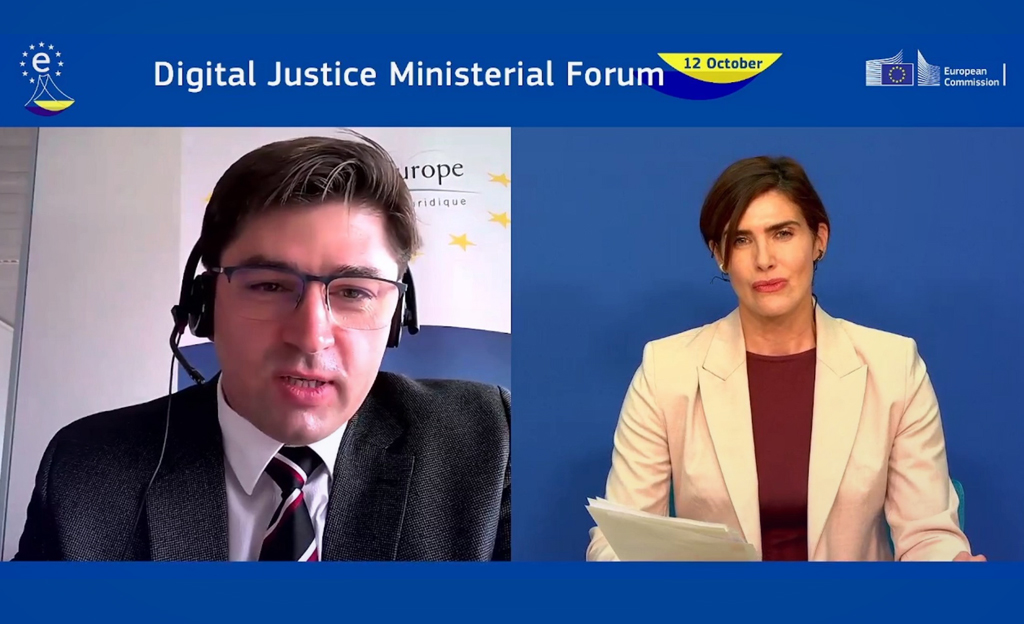
News CNUE, 22 June 2021
New content for the “Vulnerable People in Europe” website
–
The “Vulnerable people in Europe” website now has a fully updated “adults” section. This website, produced with the support of the European Union and the European Notarial Network, provides citizens with information on protection measures for vulnerable persons in the 22 European countries covered by the CNUE. Available in two languages (English and French), it is divided into two sections: one on protection measures for minors, the other for adults.
The new “adults” section now includes two parts per country:
– One on protection measures for adults who have lost capacity in the country concerned. The question of the adaptation of national laws to the Hague Convention of 13 January 2000 is addressed.
– The other on the possibilities or otherwise of anticipating a future loss of capacity in the country concerned.
Once again, two levels of information are available: one for a non-specialist audience, the other to meet the needs of notaries for precise answers in their daily practice when they find themselves, in particular, in cross-border situations.

News CNUE, 17 June 2021
The ENN has a new website
–
The European Notarial Network (ENN) has a new website www.enn-rne.eu
New navigation, new graphics, more free and practical resources for all European notaries!
A network of contacts at your service
Joining the ENN means being able to count on the help of a network of contacts covering the countries of the European Union who know the notarial profession. One contact point per country is at your service to provide you with practical information on your cross-border files. Exchanges are entirely electronic via the ENN’s secure online platform.
Communicate between notaries
Notaries using the platform can hold online discussions via secure communication spaces and video conferencing. Notaries can thus create their own professional network.
Practical tools at your disposal
The ENN provides you with bilingual tools to facilitate the exchange of information with your European colleagues in all areas of notarial practice: succession law, family law, company law, etc.
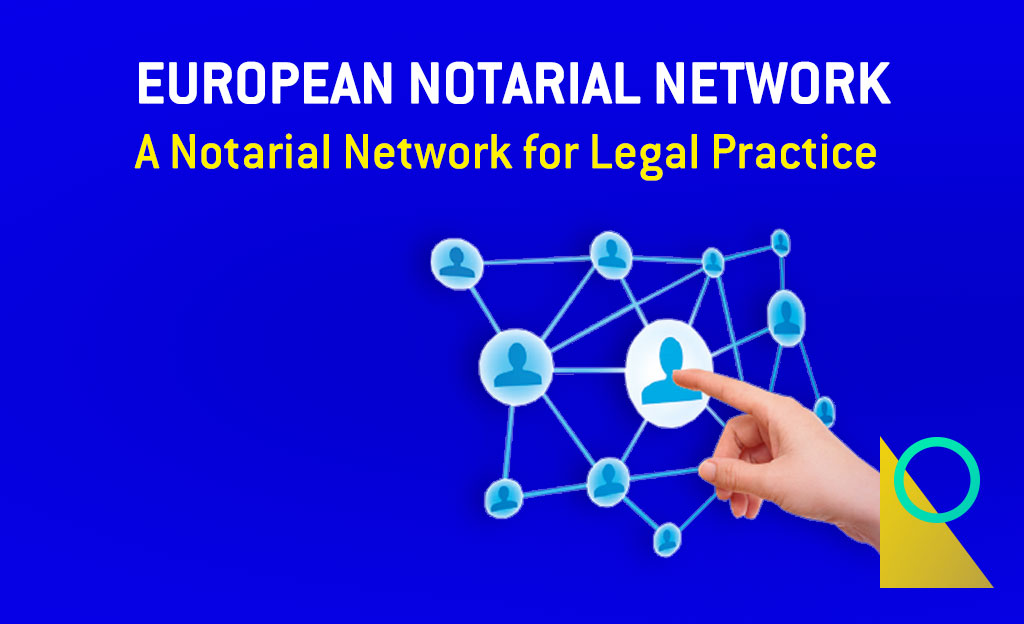
Databases available online
The ENN online platform offers a number of legal databases. Are you looking for information on the documents required by a notary in a foreign country when a citizen is faced with an international succession? Do you want to know what documents are required when a foreign company intends to establish itself or create a subsidiary in a Member State? You will find all the answers on the ENN platform.
How to register?
Registering with the European Notarial Network is very simple. Just go to the home page of the site
News CNUE, 29 March 2021
ENRWA renews its Board of Directors
–
During the ENRWA General Assembly of 10 March 2021, elections were held for the renewal of the Board of Directors by videoconference. Five directors were elected. Meeting on 22 March 2021, the directors elected Mr Octavian ROGOJANU, notary in Romania, as President of the association, then appointed Mr Anne WUILQUOT, notary in Belgium, and Mr Viktor MÁTÉ, notary in Hungary, as Vice-Presidents, Mr Pierre-Luc VOGEL, notary in France, as Treasurer, as well as Mr Sonja KRALJ, notary in Slovenia, as Secretary of the ENRWA.
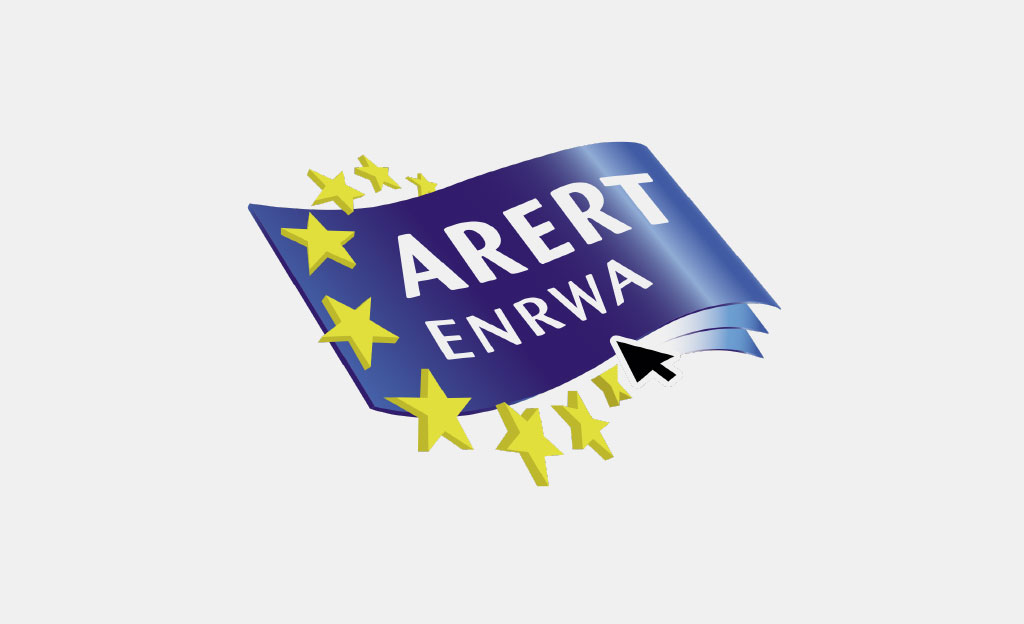
News CNUE, 23 March 2021
CNUE 2020 Annual Report
–
The CNUE Annual Report 2020 is now online > Read the report
In the context of the very “special” circumstances we are all experiencing, the report provides a detailed account of the CNUE’s activities over the past year in the following areas: digitisation of justice, the fight against money laundering, training of European notaries, etc.
Enjoy your reading
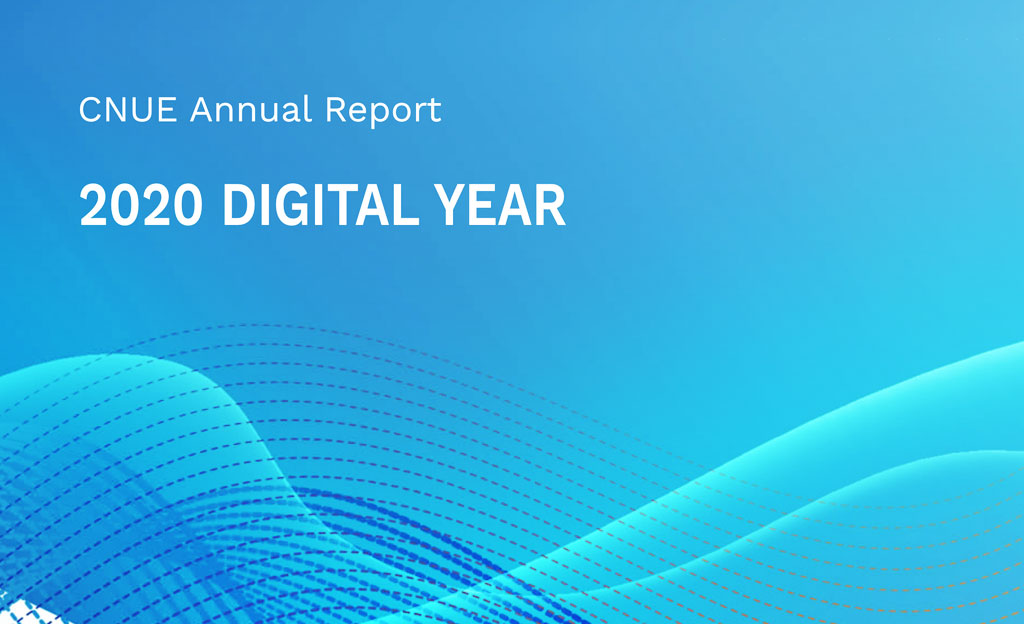
News CNUE, 15 March 2021
New ENN work programme for 2021
–
Once again with the support of the European Union, the European Notarial Network has set up its work programme for 2021 with the aim of reaching a maximum number of notaries in Europe by providing them with an ever more efficient service.
With almost 2000 notaries using the service, the ENN intends to increase its awareness this year by implementing an ambitious communication strategy. This will involve a redesign of the website and targeted communication actions at European and national level, with a particular focus on social networks.
New tools will be added to the ENN platform. A specialised section on private international law will be set up, as well as a practical guide on the enforcement of authentic instruments. Information on national legislation concerning the transposition of Directive 2008/52 (Mediation) and on the “Couples in Europe” website will be updated. Finally, workshops will be organised in Portugal and Bulgaria in order to raise awareness of European issues among notaries in the field.
News CNUE, 15 February 2021
Launch of the new CNUE training programme
–
On Monday 15 February, the CNUE launched the “EU L@w for Notaries – Notaries for EU L@w“ project, its new training programme for European notaries. With the support of the European Union and over a period of two years, the project aims to train notaries in three priority areas of EU law: 1) family law; 2) company law; and 3) data protection law, through a combination of interactive face-to-face seminars and e-learning. An important next step will be the preparation, development and implementation of an e-learning platform. This will host a number of webinars, e-learning modules and MOOCs on the three topics mentioned.
In this way, the CNUE intends to contribute to the new strategy for judicial training for the period 2021-2024, presented by the European Commission on 2 December 2020. This strategy broadens the scope of EU training offers to judicial professionals to include new areas of action, such as digitalisation and artificial intelligence. It also sets ambitious targets: by 2024, 30% of notaries should be trained in EU law every year.
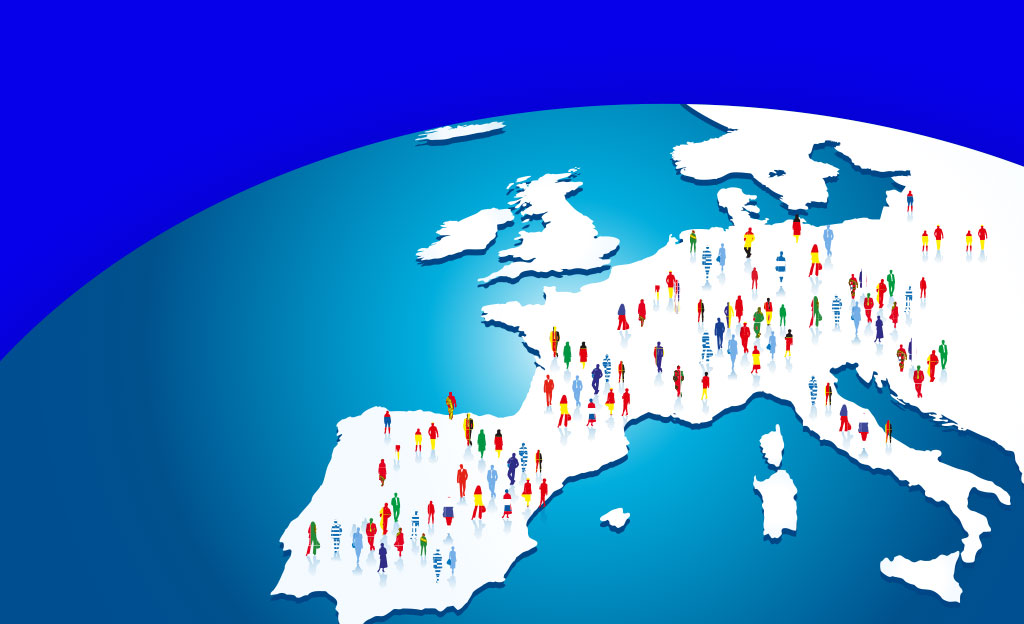
News CNUE, 4 February 2021
Launch of the “MAPE – Estates” project
–
On Thursday 4 February, the CNUE launched the project “Monitoring and evaluation of the application of EU Regulation 650/2012 on succession” (hereinafter “MAPE Succession”), co-funded by the European Union. This two-year project aims to analyse the implementation of the Regulation in all countries covered by the CNUE with the help of the 22 EU notariats and the ENRWA (European Network of Registers of Wills Association – www.arert.eu).
Regulation (EU) No 650/2012 on succession has been in force since August 2015. According to Article 82 of the Regulation, the Commission will present, by August 2025, a report on its application, including an assessment of the practical problems encountered. The report will be accompanied, where appropriate, by proposals for amendments.
Since in most EU countries the field of successions is a notarial competence, a contribution from the CNUE is expected. The evaluation carried out within the framework of the “MAPE Succession” project will cover both quantitative and qualitative data: number of successions with cross-border elements each year, number of wills identified abroad, number of European succession certificates, difficulties in applying the Regulation, etc. The results and conclusions, in the form of a study, will be presented to the European institutions at a conference in Brussels at the end of 2022.
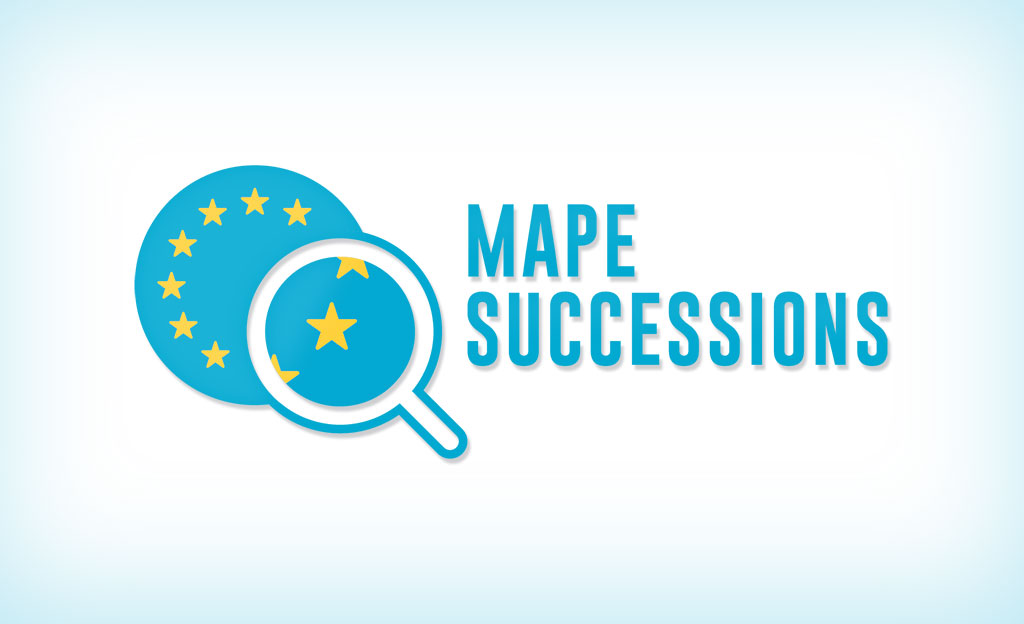
News CNUE, 8 January 2021
Ádám Tóth becomes the new President of CNUE
–
On Friday 8 January, the Hungarian notary Ádám Tóth took office as President of the Council of the Notariats of the European Union (CNUE) for the year 2021. He succeeds the Greek notary Georgios Rouskas and now represents the 22 EU notariats and the 45,000 notaries in Europe.
Important deadlines await the CNUE in 2021, in the difficult context of the COVID-19 pandemic. CNUE will follow closely the developments of the national recovery plans to be presented by the governments of the Member States. It calls for genuine consultation between the European and national institutions and the actors concerned on the ground, in order to maintain the high level of reliability of national justice systems, including, and particularly, in their preventive part.
However, the main issue on the agenda will be the digitalisation of justice. Indeed, the European Commission intends to make digital the default option in cross-border judicial cooperation. A legislative proposal is expected by the end of the year. The CNUE will offer its full cooperation to the European institutions in order to move forward in this direction under conditions of maximum legal certainty in the digital environment.
Furthermore, the CNUE will ensure that it continues its mission of consultation and exchange between notariats on technological developments, particularly through its Futurology Forum. Among the main points, the Hungarian Presidency intends to promote synergies between notariats on purely digital notarial acts, the creation of compatible electronic signatures and the electronic Apostille. A project is envisaged for the use of blockchain technology to verify and record powers of attorney.
The issue of anti-money laundering will be another priority with the publication of a European regulation planned for early 2021. In this area, the CNUE will continue to highlight the exemplary involvement of notaries alongside States in the fight against this scourge.
The training of European notaries will again be an important issue. The European Commission has recently published its new strategy for the period 2021-2024. It proposes to broaden the scope of training to new topics, such as digitisation or artificial intelligence, and to innovative themes and methods. In 2021, following this impulse, the CNUE will start a new training programme and will have an integrated e-learning platform in EU law within two years.
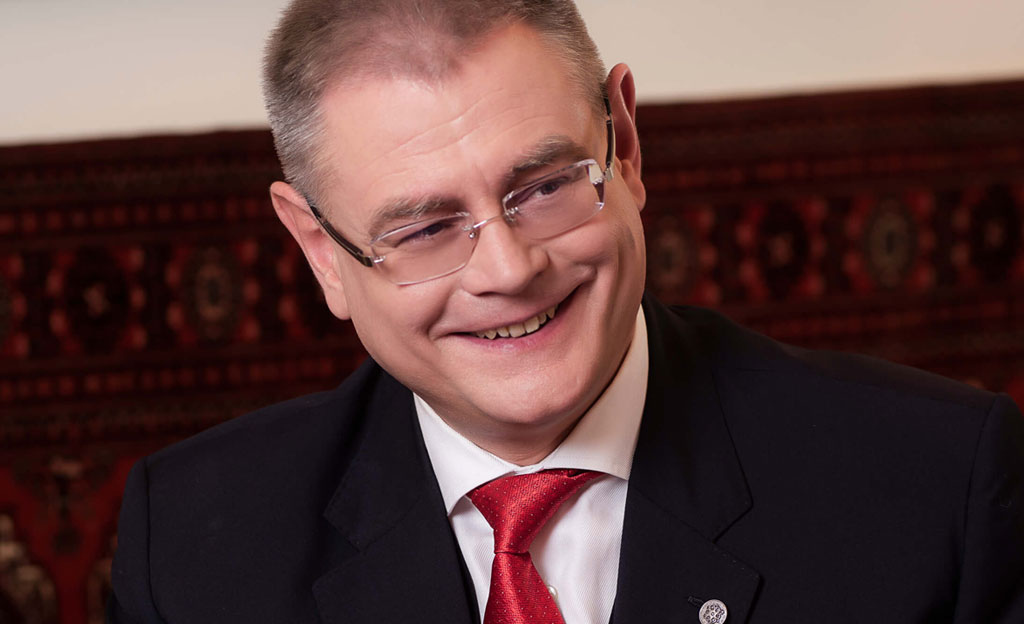
Another “raison d’être” of the CNUE is the monitoring and correct application of EU law by notaries. For example, the Directive on the digitalisation of the business life cycle must be transposed into national law by August 2021. Under the aegis of the CNUE, notariats with competences in the field of company formation will work on innovative solutions for an efficient transposition of the directive. The CNUE will facilitate exchanges between notariats and between notaries, but also with the competent authorities at national level.
A first evaluation of EU Regulation 650/2012 on international successions will also be carried out. This project, called “MAPE Successions”, will be implemented by the CNUE in partnership with the European Network of Registers of Wills Association, the Federal Council of German Notaries, the Hungarian Notarial Chamber, the Lithuanian Notarial Chamber and the Maltese Notarial Council. The project will make it possible to provide qualitative and quantitative information and analyses on the operation and impact of the Regulation for citizens in the Member States where the notary is competent in this area.
For more information on the Hungarian Presidency of the CNUE > Discover
News CNUE, 7 December 2020
The digitalisation of justice must be based on the experience of practitioners
–
The European Commission published on 2 December its communication on the digitalisation of justice systems in the European Union. It recalls in its preamble that “efficient judicial systems are essential for the functioning of the internal market and are a precondition for economic growth. Access to justice must be preserved and evolve at the pace of change, including the digital transformation that affects all aspects of our daily lives.
This need for justice actors to deepen the transition to digital was particularly acute during the Covid-19 crisis. During this crisis, Europe’s notaries mobilised to ensure that their activities, recognised as an essential service of general interest by their supervisory authorities, continued throughout the country. New procedures were tried out and proposed. However, they were based on a solid foundation that had been in place for several years: creation and interconnection of registers, dematerialisation of data transfer, online company formation, deployment of e-signature, electronic authentic instruments, videoconferencing and others.
The European Commission’s Communication is part of this development, setting out several objectives. First, to make digital the default option in cross-border judicial cooperation. This is an objective we fully support. In many countries, communications between notaries and judicial authorities are now organised in a dematerialised manner. This is the case, for example, for consultation and registration in public registers held by notaries or by the State. Thanks to the European Network of Registers of Wills Association, the registers of wills kept by the notaries are even interconnected at European level and enable citizens to find out whether last will and testament provisions concerning them are registered in another country. This is also the case for the online creation of companies, as required by a European directive. European notariats are working with their ministries of justice on innovative solutions for an effective transposition of the directive by August 2021.
A second objective of the European Commission is to promote better access to information. Europe’s notaries have been pioneers in this area, often with the financial support of the European Union. We were the first legal profession to offer a European directory of our members (www.annuaire-des-notaires.eu) to enable citizens to find a notary who speaks their language anywhere in Europe. We were also the first to offer multilingual information sites, for example on EU countries’ inheritance law (www.successions-europe.eu) or on family law (www.couples-europe.eu). This content has been added to the European Commission’s e-Justice portal, which must now be further consolidated.
The Commission also underlines the role of e-CODEX as the main tool for secure cooperation in cross-border civil, commercial and criminal proceedings. Notaries have accompanied the implementation of e-CODEX since its creation in 2010 and we will continue to work on its development.
Finally, the European Commission sets ambitious goals in its European strategy for judicial training 2021-2024 and expands the scope of training to new topics, such as digitalisation or artificial intelligence, and to innovative themes and methods. In this area, we will once again be present. Since 2014 and through our training programmes supported by the European Commission, several thousand notaries have been able to follow training courses in European law or the law of another Member State. Moreover, the notariat has committed itself to moving up a gear and within two years will have an integrated European platform for online training in EU law.
On the question of the digitisation of procedures, the stumbling block is not so much the nature of this digitisation, but its control and access. And the European Commission’s communication does not dwell on these aspects. How to ensure the protection of sensitive data? How can we ensure the independence of the judiciary in the use of computer systems? How can we reconcile artificial intelligence and human control? How can we avoid excluding the elderly or people with disabilities from the process and reinforcing the digital divide already at work within our populations?
In Europe, the law is based on the principle of preventive justice and effective regulation of economic operators. And in 22 Member States, the notary has been a guarantor of legality for several centuries and has always been able to adapt to changes in society. The notary’s office is the profession of authenticity, truth, security and data conservation on which the trust of States and our fellow citizens is based. In an age of forgery, false information, falsified data, money laundering and cybercrime, this truth and security are more than ever essential to society.
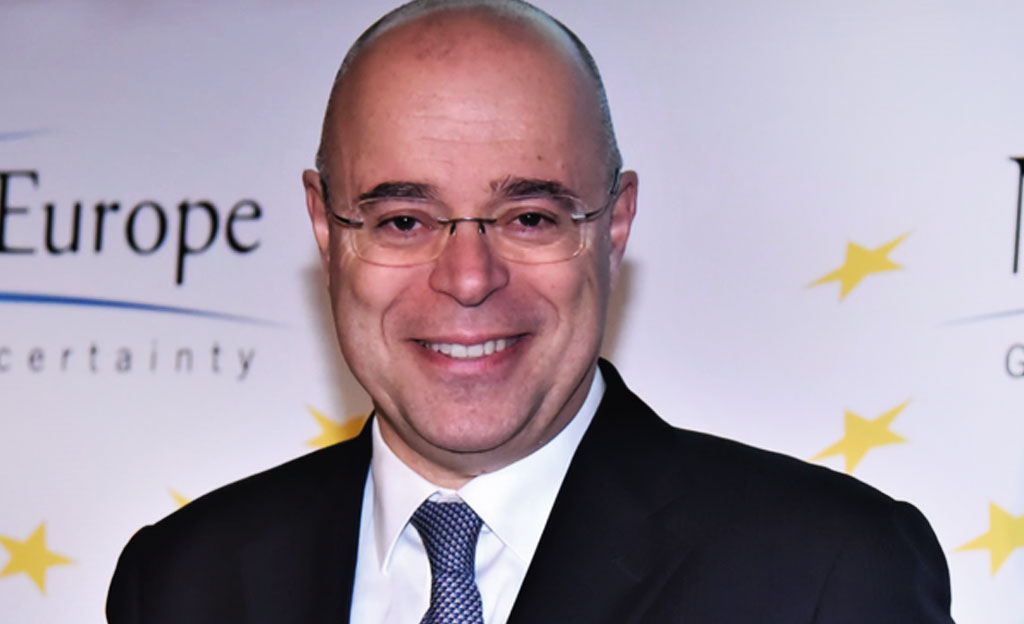
Georgios Rouskas
President of the Council of Notariats of the European Union
News CNUE, 20 November 2020
CNUE Virtual Conference
–
On 10 December 2020, the CNUE is organising a virtual conference which will also be the closing event of the 2018-2020 training programme “Europe for Notaries – Notaries for Europe”, organised with the support of the European Union.
Finally, a second panel will discuss the consequences of the current health crisis, in particular the increasing digitalisation of legal activities, through a dialogue between representatives of European notariats and the European Commission. The latter is due to present a communication on the digitisation of judicial systems and cross-border e-Justice in Europe (e-CODEX) on 2 December. The conference will be the opportunity to come back in details on the content of these announcements.
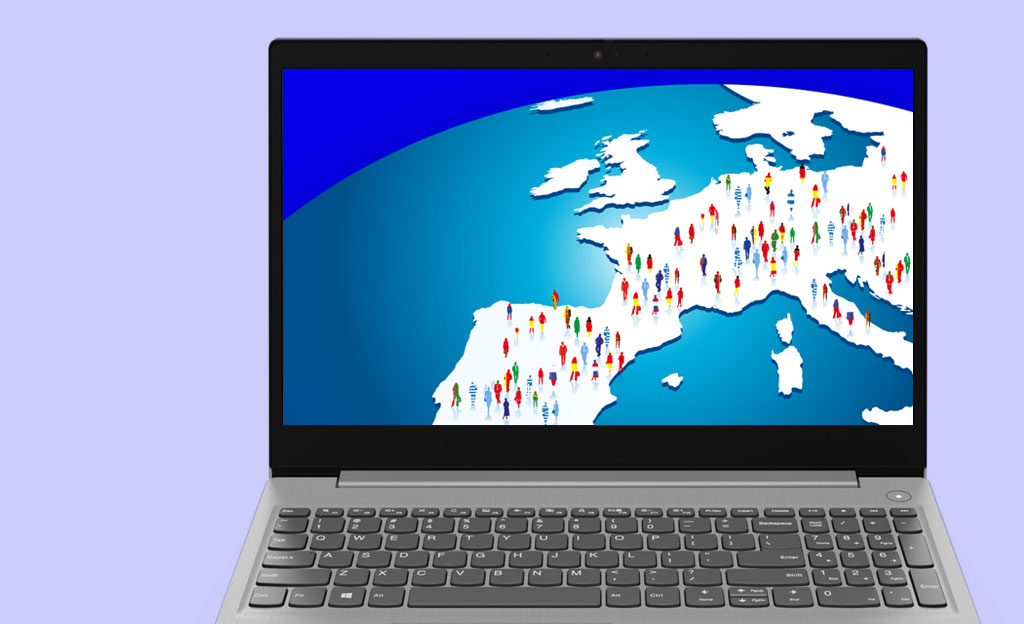
News CNUE, 9 November 2020
Meeting of the European Notarial Network
–
On 3 November, the interlocutors of the European Notarial Network (ENN) held their second annual online meeting. A progress report on the implementation of the annual work programme was made:
– Updating the “Vulnerable persons in Europe” website and its section devoted to adults.
– Drafting of a practical booklet on the circulation of public documents in Europe.
– Design of a communication strategy for the ENN to make it better known among European notaries.
The work programme for 2021 was also reviewed:
– Organisation of cross-border workshops in Portugal and Bulgaria.
– Drafting of a new practical booklet on the execution of authentic instruments.
– Revision and consolidation of the legal information on notarial practice made available in the platform, including on the transposition of the Mediation Directive 2008/52.
– Addition of additional questions relevant for practitioners and their answers on the CNUE website “Couples in Europe”.

News CNUE, 5 November 2020
Conference Ensuring legal certainty in exceptional circumstances
–
On the occasion of the European Day of Justice and within the framework of the European Notarial Network, the Federal Chamber of German Notaries “Bundesnotarkammer” and the CNUE jointly organised a conference in Berlin on 2 November on the theme “Guaranteeing legal security in exceptional circumstances”. At a time of unprecedented health crisis and the digital age, this conference was an opportunity to review the various initiatives taken by European notariats to ensure the continuity of their services, in particular through the development of new digital tools, such as the creation of a blockchain for powers of attorney in Germany or an online company formation system in Italy.
The President of the Bundesnotarkammer, Jens Bormann, recalled that, during these difficult times, it was the duty of notaries, as public officers, to continue their mission towards citizens and companies. In the face of the need for social distancing, the use of videoconferencing and dematerialised access to registers made it possible to ensure the continuity of the notaries’ service. However, Mr Bormann stressed that digitalisation should not be an end in itself: under no circumstances should the changes made undermine quality criteria, such as the guarantee of full legal certainty. In this respect, the German Minister of Justice and Consumer Protection, Christine Lambrecht, congratulated the German notary’s office on the efforts made in recent months, particularly with regard to the implementation of the new online company formation system.
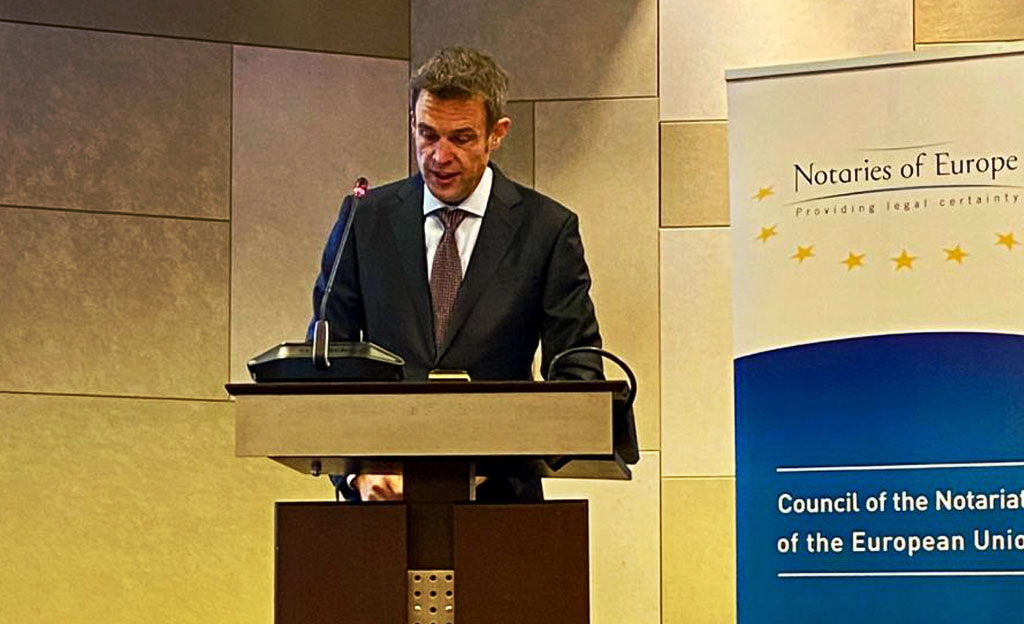
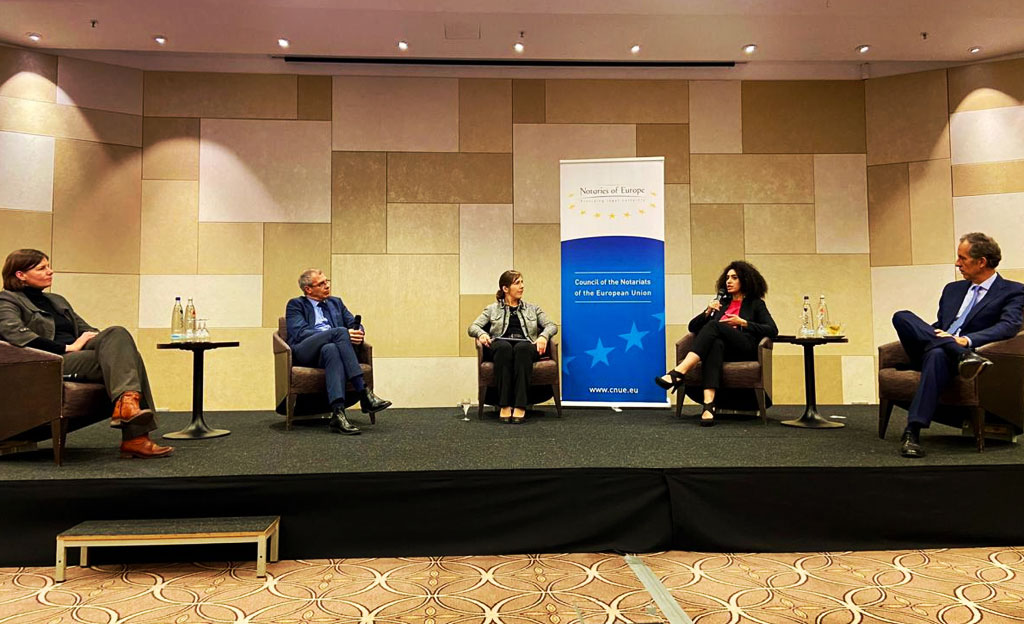
The President of the CNUE, Georgios Rouskas, underlined the willingness of Europe’s notaries to contribute alongside the European institutions to the development of a comprehensive EU strategy on the digitalisation of justice. To this end, he called for the promotion of e-skills in the justice sector, in order to enable notaries, lawyers, judges, prosecutors, court staff and other justice practitioners to use digital tools in an efficient way and with respect to legal certainty. He also insisted that digital tools should not undermine the fundamental principles of legal systems, citing as an example the ongoing work at European level on the use of artificial intelligence, which could also affect the justice sector.
The conference was followed the next day by a meeting of the European Notarial Network, which aims to offer online support to European notaries in handling their cross-border cases.
News CNUE, 4 November 2020
New e-learning tools on the “EMMA” MOOC
–
In the framework of the GoInEUPlus project, supported by the EU Justice Programme 2014-2020, the Fondazione Italiana del Notariato, the University of Florence (coordinator), the University of Valencia, the University of Coimbra, the Eötvös Loránd University of Budapest, the Centre National de la Recherche Scientifique (CNRS), the Associazione Avvocati Matrimonialisti Italiani per la tutela delle persone, dei minorenni e della famiglia (AMI) – Sezione Distrettuale di Firenze and the Fondazione De Gasperi have published online on the MOOC platform “EMMA the following e-learning tools, available free of charge
– an e-learning course on “Family and Succession Law Issues”: 10 video lessons in the languages of the speakers with English dubbing, downloadable slides, relevant legislation, case law, a bibliography and a glossary;
– two sit-coms: interactive scenarios with simulated practical cases.
All e-learning resources deal with cases and issues related to the application of EU Regulations 650/2012, 1103/2016 and 1104/2016. They offer a great opportunity to improve legal knowledge in the field of succession, matrimonial property regimes and the property consequences of registered partnerships.
This was done with the support of experienced providers for the development of the technical part of the e-learning tools and selected experts in the field for the scientific content.
> See instructions for accessing the EMMA platform
For more information on the GoInEUPlus project:
> Visit the website “goineuplus.eu

News CNUE, 30 October 2020
Project – A litigation-free justice for Europe
–
The CNUE is a partner in the EU-supported project “Dispute-free Justice for Europe”, which will start on 1 December 2020.
In Austria, Croatia, the Czech Republic, Hungary and the Slovak Republic, there is a legal peculiarity that notaries exercise jurisdictional functions, particularly in succession proceedings, but also in other areas of civil justice (e.g. family law, payment orders). In Slovenia, the introduction of such jurisdictional functions for notaries in succession cases has been under consideration for some years now. In view of this, the jurisdictional function of notaries in the context of the EU legal framework needs to be examined in more detail.
The project will analyse for Austria, Croatia, the Czech Republic, Hungary and the Slovak Republic the term “court” in the context of the EU Succession Regulation in the context of non-contentious judicial procedures of notaries from the perspective of comparative law, fundamental rights and the rule of law. The project will also include Slovenia, where the reflection of policy makers, academics and the Chamber of Notaries on the transfer of judicial tasks to notaries is progressing.
In this context, the project aims to improve the application of the EU Succession Regulation through a better knowledge and understanding of the jurisdictional functions performed by notaries in the above-mentioned Central European Member States. As the term “court” has been extended by the Succession Regulation and other EU instruments to legal professionals (e.g. notaries) exercising jurisdictional functions, the project aims to identify common minimum procedural standards that allow for the fulfilment of the criteria of the concept of “court” laid down by EU law. The project also analyses fundamental rights aspects and rule of law requirements in the participating Member States. On this basis, recommendations to legislators at European and national level will be presented.
The economic component of the project will carry out an in-depth analysis of the function of civil law notaries as judicial commissioners in order to assess the social and economic benefits resulting from these non-litigious judicial procedures. The study will include a major data collection exercise to identify and quantify the significant economic and legal benefits that can be derived from reducing an economy’s ex-post legal expenditure. The data collected will be used to develop composite indicators to provide a comprehensive mapping of non-litigation judicial services aimed at reducing the burden on the judicial system. For this purpose, the respective legal acts and litigation prevention judicial services will be compared in substance and scope in order to better reflect non-contentious judicial procedures in the European Justice Scoreboard or in the work of the CEPEJ of the Council of Europe. On this basis, new indicators will be developed to better reflect non-contentious judicial proceedings in these instruments. Recommendations and conclusions addressed to policy makers will be presented.
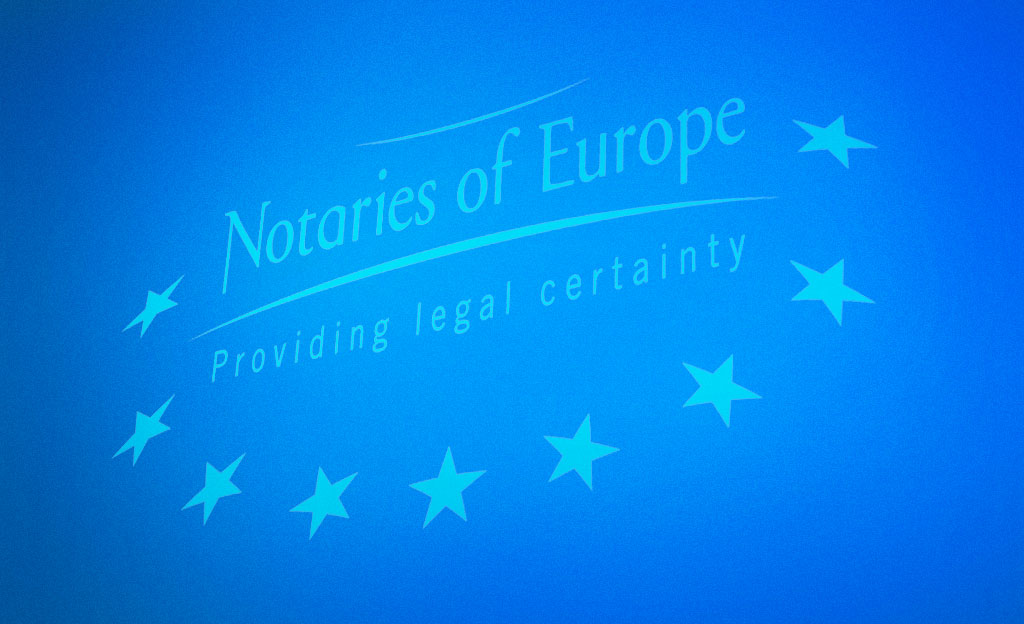
News CNUE, 23 October 2020
Slovenia – European Day of Justice
–
Every year, on the occasion of the European Day of Justice, which is celebrated in the EU Member States, Slovenian notaries open the doors of their offices and are available to give advice to visitors in the field of civil law. Due to the outbreak of COVID-19, the open day will be organised in a virtual format on 23 October 2020, between 9 am and 12 pm. Slovenian notaries will make citizens aware of their rights, with a special focus on wills, their drafting and conservation.
As part of the European Day of Justice, a virtual ceremony will be held during which a short documentary film on the history of the notary’s office in Slovenia, made on the occasion of its 25th anniversary, will be presented.
The premiere of the film, with English subtitles, will take place on Friday 23 October 2020 at 12 noon.
The film can be viewed on the Facebook profile of the Slovenian Chamber of Notaries.
News CNUE, 22 October 2020
European Justice Day – 25 october 2020
–
On 25 October, we will celebrate the European Day of Justice. Organised by the European Commission and the Council of Europe, this symbolic day aims to bring justice closer to the citizens and to inform them about their rights.
Every year, the CNUE joins in these celebrations and its members organise information sessions, educational conferences and free consultations in which several thousand people, whether they are ordinary citizens, students, pensioners or entrepreneurs, take part. They can get information, ask questions about their family and property situation or learn more about the role of the notary and the European and national institutions.
This year, the European notariat is organising events in the following countries
– Germany
The Bundesnotarkammer and the CNUE are jointly organising a conference online and in Berlin on 2 November on the subject of “Ensuring legal security in exceptional circumstances”. On this occasion, the German Minister of Justice and Consumer Protection, Christine Lambrecht, has confirmed her participation in the opening ceremony. Registration is open until 28 October
> Register now
– Belgium
The Belgian notariat is organising Facebook Lives on “How to prepare my succession”.
On 26 October at 12.30 pm for French speakers.
> Registration for French speakers
October 28 at 12:00 for Dutch speakers.
> Dutch-speaking registration
– Spain
A major information campaign in the press and social networks will be organised by the Spanish notariat for the young public.
– Italy
On 25 October, a digital version of the play “This Constitution is a show” will be broadcast simultaneously in six prisons. This play has already been performed in schools and theatres. During the performance, notaries will describe the Constitution to the prisoners as if it were a novel, focusing on the articles related to detention and prisoners’ rights (inviolable rights, principle of equality, right to defence, fair trial, etc.) using both texts and commentaries of the Constitution with a soundtrack designed for the event, video clips, references to the press, television and journalists.
– Lithuania
On 26 October, all Lithuanian notary offices will be open to the general public for free legal consultations.
– Malta
On 29 and 30 October, the Maltese Notariat is organising a conference on the practical aspects of matrimonial property regimes and registered partnerships in the context of the European Regulations 2016/1103 and 2016/1104.
> More information: info@notariesofmalta.org
– The Netherlands
The Dutch notariat is organising a webinar on 23 October on “European couples”. This webinar will deal with marriage contracts, registered partnerships and the purchase of a house for international couples.
> Contact Marie-Louise de Vos: m.devos@knb.nl
> Contact Lineke Minkjan: l.minkjan@knb.nl
From 25 to 31 October, the notarial records of the Amsterdam city archives will be on display
> Contact Ellen Fleurbaaij: e.Fleurbaay@amsterdam.nl
> Visit the website
– Poland
The Polish notary’s office is organising “The Open Day of the Notary’s Office – Watch your business. Protect your assets. Talk to the notary” on 28 November. The regional chambers of notaries will answer questions from the general public by telephone and internet.
– Romania
On 25 October, between 9am and 1pm, the Romanian notariat is organising online or telephone legal consultations for the general public.
– Slovenia
On 23 October, Slovenian notaries will inform and educate citizens online about their rights in the field of civil law. Special attention will be paid to wills, their drafting and filing. On the same day, a solemn event will be organised during which a film will be previewed on the history of the notary’s office in Slovenia, shot on the occasion of the 25th anniversary of the notary’s office in independent Slovenia. Finally, a new edition of the magazine “Notarski vestnik” will be published, and notaries will appear in the media and on TV phone-in shows where they will answer viewers’ questions in the field of civil law.
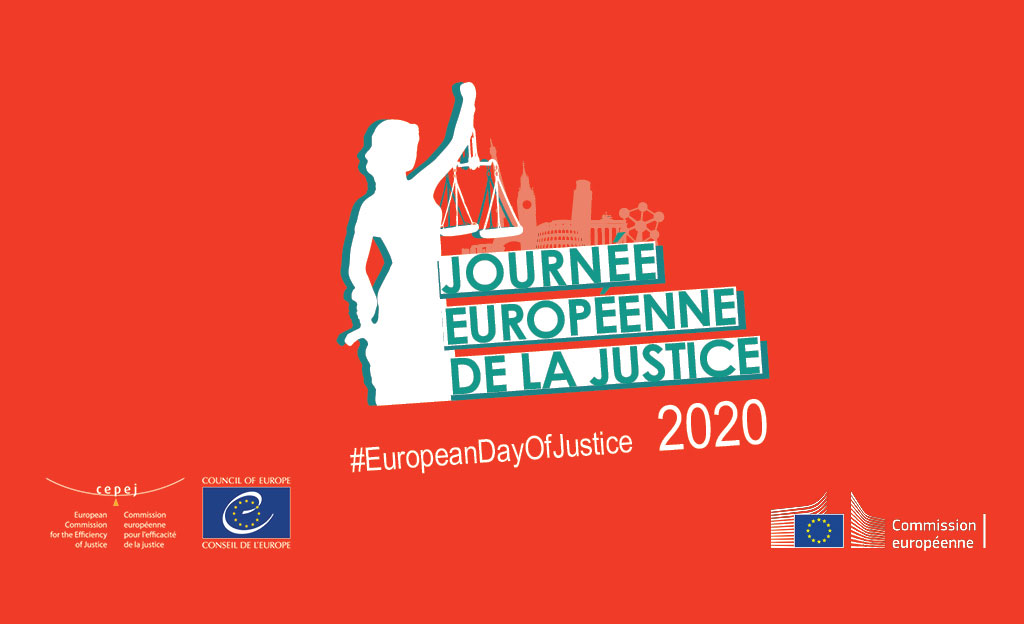
News CNUE, 19 October 2020
Conference – Ensuring legal certainty in exceptional circumstances – 2 november 2020
–
On the occasion of the European Day of Justice and in the framework of the European Notarial Network, the Bundesnotarkammer and the CNUE are jointly organising a conference online and in Berlin on 2 November on the topic of “Ensuring legal certainty in exceptional circumstances”. On this occasion, the German Minister of Justice and Consumer Protection, Christine Lambrecht, has confirmed her participation in the opening ceremony.
The central question of the conference will be how to ensure legal certainty and provide efficient access to non-tariff services in the digital age. Notaries will have to innovate and digitise their procedures and ensure that Member States create modern and fast procedures for the preventive administration of justice, especially with regard to public registers. But beyond that, it will be shown that notaries play a key role in protecting privacy and keeping basic information on key economic rights (such as ownership of real estate or ownership and management of companies) under reliable, impartial and demonstrably secure public control.
The first part of the conference will present the experiences of notaries during the pandemic in different circumstances in the different Member States and will explore new digital tools such as video conferencing, electronic identity card access and management and highly secure digital storage systems. This part will end with the presentation of a prototype developed by the Bundesnotarkammer for the use of blockchain technology in the notaries’ working environment.
The second part of the conference will give representatives of European notariats the opportunity to present their national digitisation projects, thus encouraging participants from other Member States to attend.
The closing panel of the conference will bring together representatives from the political, legal-technical and notarial worlds.
The registration form is open until 28 October.
> Register online
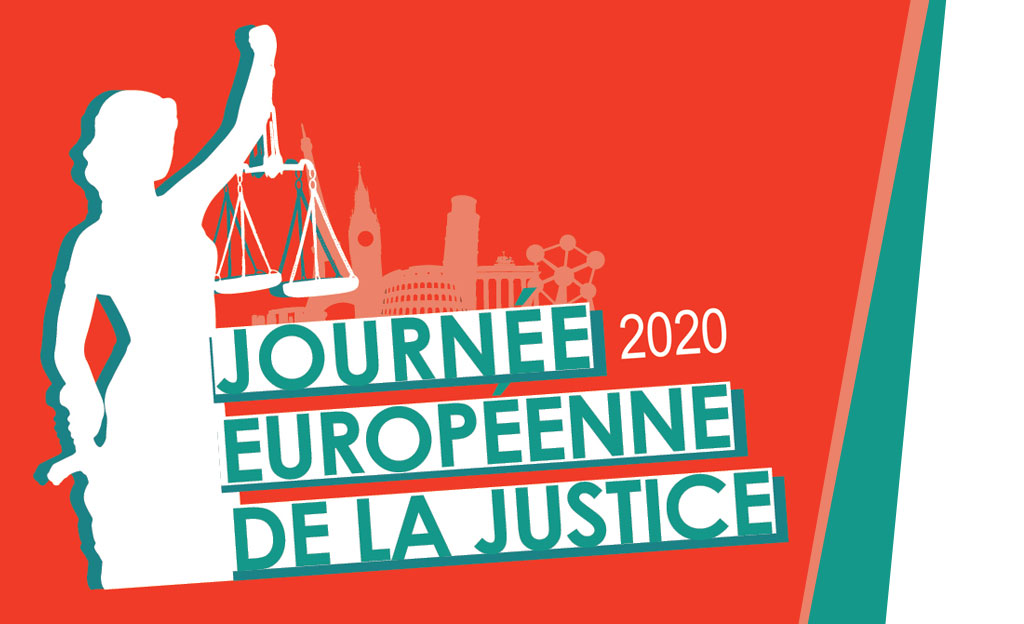
News CNUE, 13 October 2020
Cross-industry anti-money laundering webinar, 6 October 2020
–
The CNUE organised a cross-industry webinar on anti-money laundering on 6 October 2020. This workshop was held in the framework of the 2018-2020 training programme “Europe for Notaries – Notaries for Europe” supported by the European Union.
Around 120 participants took part in the discussions, which were structured around two panels:
– One on “The identification of the beneficial owner in legal persons – challenges and perspectives”.
– The other entitled “What do competent authorities expect from obligated entities? Gaps and ways to improve collaboration”.
Participants included notaries from all over Europe, but also representatives of other professions – accountants, lawyers, judges – , the banking sector, supervisory authorities, Interpol and even the European Commission, in the person of Ms Raluca Prună, Head of the Financial Crime Unit at DG FISMA.
Ms Prună returned to the Action Plan published on 7 May 2020 and the various initiatives that will be undertaken to strengthen the European anti-money laundering framework. In the context of the public consultation organised by the European Commission, Mr Georgios Rouskas, CNUE President, presented in detail the CNUE proposals which can be summarised as follows:
– A future European regulation should take into account the following elements in order to remedy the lack of consistency caused by the divergent transposition of the directives in the Member States:
• the list of covered entities
• the tasks of financial intelligence units
• reporting obligations;
• registers of central bank accounts;
• the ceiling for large cash payments.
– Given the differences between Member States regarding money laundering risks, some elements should be regulated by national law. This would allow Member States to tailor solutions through a risk-based approach adapted to their respective national jurisdictions.
– As notaries are already subject to very strict supervision at national level – usually exercised by judicial authorities – CNUE suggests that this should not be altered by an additional European supervisory authority. A central EU supervisory authority should have direct powers over the financial sector and support Member States by sharing knowledge and experience to improve supervision by national authorities.
The videos of the webinar are available at the following links:

News CNUE, 7 October 2020
A new anti-money laundering training tool made available by the Spanish Notariat
–
Practitioners can now find, in free access, on the ENN platform, the “Training and awareness course on the prevention of money laundering” developed by the General Council of Spanish Notaries:
Used as a state-of-the-art training tool in the prevention and fight against money laundering and terrorist financing, it contains a series of training videos that allow notaries to deal with specific situations and cases that they may encounter in the day-to-day professional life of their offices.
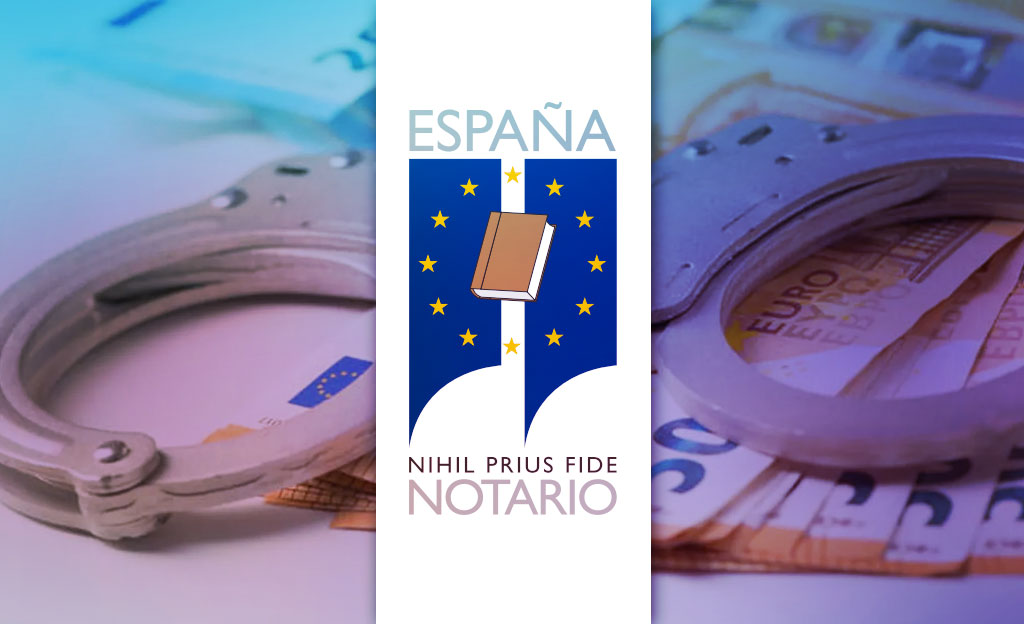
News CNUE, 15 July 2020
Couples in Europe – Matrimonial property regimes and registered partnerships in 33 European countries
–
Knowledge of foreign law on property relations between spouses and registered partners, especially after the adoption of the two EU Regulations (2016/1103 and 2016/1104), remains of particular interest to legal practitioners (whether judges, notaries or lawyers), as they may often be called upon to deal with property matters of spouses and partners that have cross-border effects.
However, with so many international couples moving and operating in more than one country, even citizens may well be interested in the laws of other countries, in order to be informed and to be able to better organise the legal status of their property relationship with their spouse or partner, as well as succession issues.
“Couples in Europe“ is a practical guide to the laws currently applicable in thirty-three European countries on issues relating to the property rights of spouses and partners, such as the conditions for the validity of marriage and registered partnership, the basic matrimonial and partnership regimes established by law in each country, and the possibilities that each national legislator has conferred with regard to the choice of a property regime different from the one in force.
This collection of reports also covers the assets that constitute the joint or personal property of a couple, as well as joint and personal debts. It discusses the property effects of the default legal matrimonial regime and those of matrimonial agreements between spouses and partnership contracts between partners, as well as between the couple and third parties. It also contains information on the conditions for transferring property (especially real estate) belonging to one or both partners or spouses.
Finally, the book explores the powers of each spouse or partner in property matters, the conditions for the validity of matrimonial and partnership contracts, the publicity of the chosen regime, the existence or absence of an inventory of property, the rules of private international law governing property relations, including the law of professio juris, and other issues.
The thirty-three countries participating in this publication are Austria, Belarus, Belgium, Bosnia and Herzegovina, Bulgaria, Croatia, Cyprus, Czech Republic, Estonia, France, Georgia, Germany, Greece, Hungary, Italy, Kosovo, Latvia, Lithuania, Luxembourg, Montenegro, Northern Macedonia, Poland, Principality of Andorra, Romania, Russia, Serbia, Slovakia, Slovenia, Spain, Switzerland, Turkey, Ukraine, United Kingdom.
This edition includes the reports in English or French, depending on the language choice made by the rapporteur for each country. Thus, twenty-seven countries present their legislation in English, while six do so in French. The reports in French are accompanied by summaries in English.
This edition is the result of the collaboration of three European notarial institutions: CAE – IRENE – CNUE.
The coordinator of the project is Marianna Papakyriakou, a notary in Greece and Vice-President of the EAC.
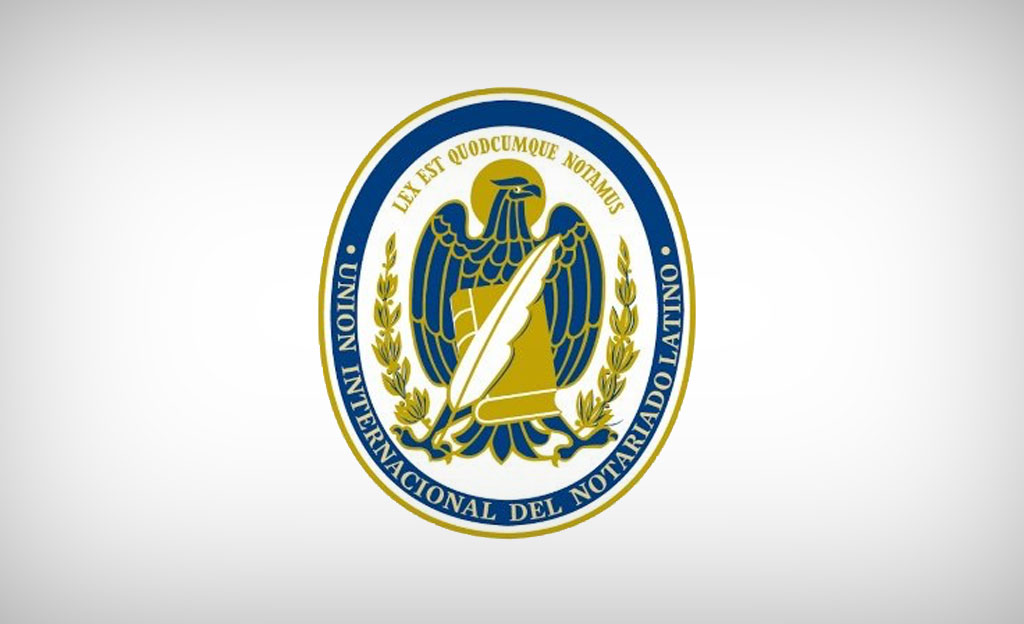
News CNUE, 16 June 2020
CNUE publishes the second issue of its mook on the fight against money laundering
–
Within the framework of the training programme III “Europe for Notaries – Notaries for Europe”, the CNUE publishes the second issue of its “mook”, this time dedicated to the fight against money laundering.
The publication can be consulted at the following links:
> Read the publication in French
> Read the publication in English
The aim of this publication is to provide European notaries, and more broadly practitioners, with an overview of the work of international bodies and the legislation in force in the field of anti-money laundering. It will be a useful source of information for the professional who, in his daily practice, must be able to serve the best interests of his clients, the State and society in general.

News CNUE, 26 February 2020
CNUE Annual Report 2019
–
The CNUE Annual Report 2019 is now online > Read the report
The report provides a detailed account of the activities of the CNUE over the past year, including:
– The entry into force of the EU Matrimonial Property Regimes and Registered Partnerships Regulations on 29 January 2019 under an enhanced cooperation procedure involving 18 EU member states.
– Participation in the European Parliament’s “This time I vote” campaign. This pan-European and non-political campaign aimed to encourage as many people as possible to vote in the European elections in May 2019.
– The publication of the Notaries of Europe’s proposals for the European elections.
> Read the publication
With this manifesto, the CNUE intended to make a series of recommendations and proposals for future MEPs and members of the European Commission.
– The meeting in London, in the presence of the French Ambassador to the United Kingdom, Mr Jean-Pierre Jouyet, with British practitioners who were invited to share their views on the Brexit and the concrete consequences for citizens in terms of family law, inheritance law or the fight against money laundering.
– The redesign of the European directory of notaries, which lists the 45,000 notaries in Europe.
> See the website
– The organisation of the fourth edition of the Notaries of Europe Open Days with events in fourteen EU countries.
– The organisation of the “Europe in Action” exhibition at the European Parliament from 11 to 15 November 2019 and the first edition of the CNUE Innovation Award.
> See the website
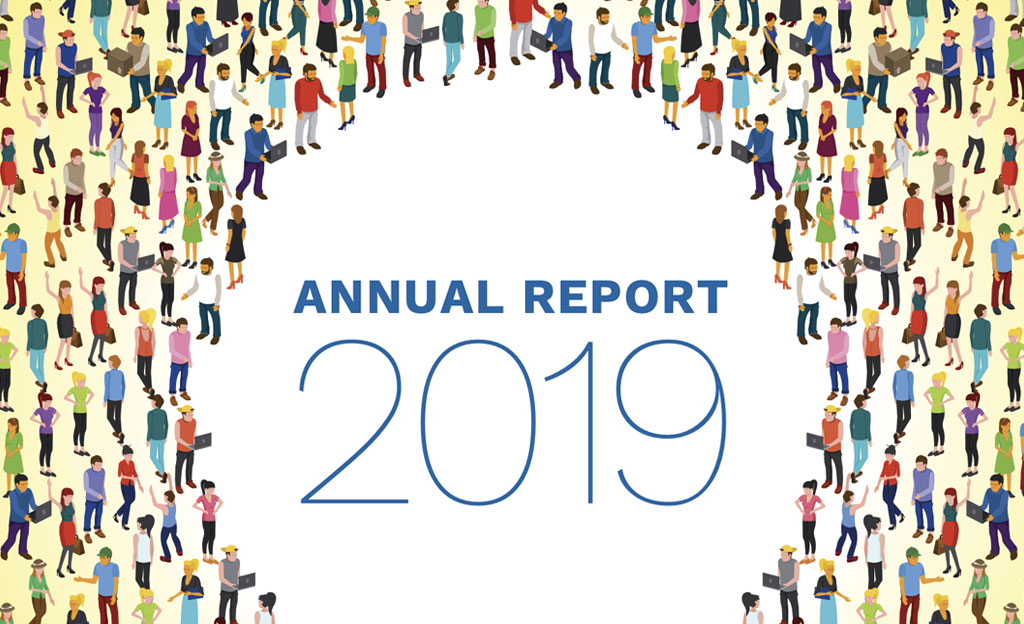
News CNUE, 17 January 2020
Mr Georgios Rouskas is the new President of CNUE
–
On the occasion of the handover ceremony held in Athens on 14 January in the presence of the President of the Hellenic Republic, Prokópis Pavlópoulos, Mr Georgios Rouskas became the new President of the Council of Notariats of the European Union (CNUE) for the year 2020. He succeeds the French notary Pierre-Luc Vogel.
Among his work priorities, Mr Rouskas intends to focus on issues related to company law, in particular the transposition into national law of the directive on the life cycle of companies, the fight against money laundering and the financing of terrorism, as well as on the numerous challenges related to digitalization (blockchain, artificial intelligence, etc.) for which the European institutions have already announced their willingness to concentrate their efforts.
Biography
Georgios Rouskas was born in Athens in 1964. He graduated from the Law Department of the Faculty of Law of the National and Capodistrian University of Athens in 1988. In 1990 he was appointed as a lawyer at the Athens Court of First Instance, practising in private practice for three years. He was appointed notary in Athens in 1993.
Since 2015, he has been Chairman of the Board of Directors of the Chamber of Notaries of Athens, Piraeus, Aegean and Dodecanese, having been elected member of the Board from 2003 to 2009, Treasurer from 2009 to 2012 and Vice-Chairman from 2012 to 2015. He is Chairman of the Coordinating Committee of the Chambers of Notaries of Greece.
Georgios Rouskas is specialised in real estate taxation, real estate law and cadastral legislation. He has made numerous presentations on these areas at seminars organised by the Chambers of Lawyers and Notaries and by the Associations of Tax Experts. He has also published a large number of articles on the above-mentioned areas.
News CNUE, 27 September 2019
German and Spanish notaries ready for online company formation
–
At a joint press conference on Wednesday 18 September, the German and Spanish notariats announced that they are now ready for the creation of online companies in the context of the transposition into national law of Directive 2019/1151.
This directive 2019/1151 on the use of digital tools and processes in company law was adopted in June by the European Parliament and the Council, setting August 2021 as the deadline for transposition into national law.
The President of the General Council of Notaries in Spain, José Ángel Martínez Sanchiz, explained this morning that “German and Spanish notaries have common principles and have worked with the European Commission to prepare this Directive, in the context of the Council of Notariats of the European Union”.
The new directive, which allows the creation of companies entirely through remote digital channels, “relies on the involvement of notaries to guarantee legal security in the process, the identification and verification of the legal capacity of entrepreneurs, impartial advice and the prevention of money laundering, terrorist financing and tax fraud”, said Martínez Sanchiz.
For his part, Jens Bormann, President of the Federal Chamber of German Notaries, referred to “the important role that the European legislator has assigned to notaries in the directive, placing them at the heart of the procedure for incorporating companies online. The aim is to ensure that companies are legally constituted in order to avoid any subsequent disputes. At the same time, the reliable identification of the entrepreneur will make it possible to establish who is behind each company and who represents it, and will be of vital importance for the registration in the commercial register, since the control of the process by a notary gives all the assurances that the information is reliable and legal”, added Mr Bormann.
The online process of setting up a company in Spain
Once the directive is transposed into Spanish law, Martínez Sanchiz explained, any citizen wishing to set up a company entirely online will continue to enjoy the benefits of notarial participation in the process: legal certainty, control of legality, impartial advice and prevention of financial offences.
He also revealed that the General Council of Notaries is already working on the development of the technical means that will allow the public deed of incorporation of a company to be carried out online. This process will include
• Identification of the founding shareholders before the freely chosen notary by means of an electronic national identity document, in accordance with the eIDAS Regulation.
• Confirmation of the real identity of the founding shareholders by the notary by means of the information contained in the electronic national identity document and by videoconference.
• Legal advice offered by the notary to the future entrepreneur in a digital environment, with the content of the public deed agreed.
• Digital confirmation by the notary of the capital contributed to the future company.
• Electronic signature of the notarial deed, with a digital certified copy sent to the entrepreneur.
• Online copy of the deed sent to the commercial register by the notary.
In order to provide more detailed information to all those interested in the issue, the General Council of Notaries has prepared an explanatory video below.
News CNUE, 30 August 2019
A new European grant for the ENRWA
–
On 16 July 2019, the ENRWA obtained co-funding from the European Commission in order to implement the RERT’Improv project, which aims to optimise the interconnection of the registers of wills and SSCs through two actions. The first will consist in increasing the performance of the IT platform, by improving the fineness and quality of the information exchanged. The second aims to increase the network’s visibility by communicating effectively with notaries. This two-year project, in which the Association pour le Développement du Service Notarial en France is a partner, should enable the number of queries to be increased, as well as the number of cases in which a will is found or the certainty of the absence of a will.
Moreover, targeted communication actions will be carried out in cooperation with the Notariats which so wish in order to promote the search for wills and SSCs in foreign registers.
News CNUE, 23 July 2019
FATF highlights the role of the notary system in the fight against money laundering
–
On 8 July 2019, the Financial Action Task Force on Money Laundering (FATF) published its new guidelines for a risk-based approach for legal professionals. The previous edition was published in 2007-2008. “The anti-money laundering system used by Spanish notaries represents a significant step forward for public authorities,” notes the FATF.
“All parties subject to anti-money laundering requirements can consult the beneficial ownership database (Base de Datos de Titular Real, BDTR),” it points out.
The FATF proposes a series of measures for governments to combat money laundering and terrorist financing and to protect the integrity of the international financial system. These measures include a model to be followed by the money laundering prevention system used by notaries in Spain, and specifically its BDTR.
The guide has been sent to the 39 countries that form part of the FATF, including Spain, as well as to member associations such as the European Union.
The Guide states that “The AML system used by Spanish notaries represents a considerable advance for the public authorities who, thanks to its implementation, now have access to a new source of valuable information: the notarial indexes (a single database with information on all public instruments and policies notarised and attested in the country). This information is processed in an integrated and automated way to detect possible money laundering and terrorist financing operations.
On the Beneficial Ownership Database (BDTR), created in 2012 and regulated by Royal Decree 304/2014, the FATF notes that “all parties subject to anti-money laundering obligations can consult the BDTR to facilitate compliance with due diligence obligations. This therefore allows the FIU and law enforcement agencies to obtain information on owners with a percentage of less than 25% (full corporate regime) in Spanish private limited companies, as of a given date.”
The FATF emphasises the two levels of quality of information in the BDTR, with “information verified in accordance with the transaction of sale and purchase of shares of Spanish private limited companies” and “information based on a declaration to a public officer (foreign companies, foundations, associations, Spanish companies)”.
Finally, the FATF states that “the General Council of Notaries has reached agreements with associations of parties subject to AML obligations (banks, savings banks, investment firms, auditors, lawyers, lotteries, credit institutions, etc.)”.
The Beneficial Ownership Database identified the beneficial owners, accredited in 86% of cases, of 2 300 000 legal persons, including companies and associations, foundations and political parties.
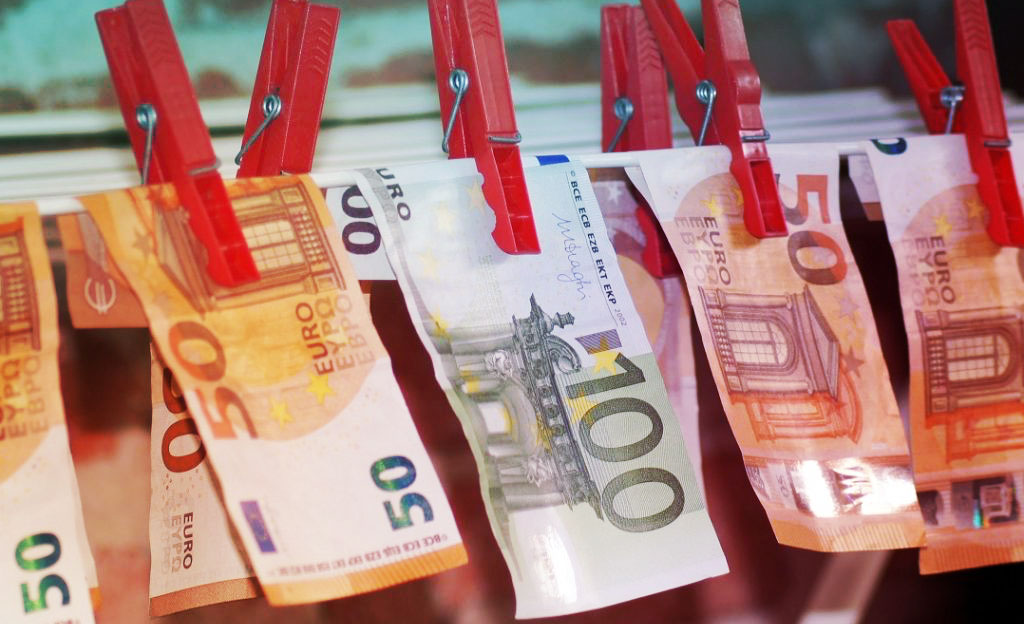
News CNUE, 3 June 2019
Workshop with the Dutch notariat on the interconnection of the registers of wills and CSE
–
In cooperation with the Dutch notariat, the ENRWA organised a workshop on 14 May in The Hague. This workshop brought together about twenty Dutch notaries, representatives of the national register and ENRWA administrators, around the theme of the interconnection of registers of wills and SSCs.
The ENRWA President, Mr Philippe Girard, introduced this meeting by recalling the links between the Dutch notariat and the ENRWA: interconnected since 2012, the Dutch register is among the most active on the ENRWA platform. A significant number of wills are also found each year in the Netherlands (39%). Mr Geertjan Sarneel, ENRWA administrator and Dutch notary, stressed the ease of use of the tool. Mr Girard drew the attention of the participants to the responsibility of the notary if he did not query a foreign file when there is a provision in this country. Aart Barkey Wolf, member of the KNB Board, then took the floor to warmly welcome the ENRWA members and the notaries who had come to participate in this workshop.
This meeting made it possible to explain, from a practical point of view, the steps enabling the search for wills from the notary’s office to the receipt of the reply from the foreign register. Fruitful exchanges thus took place between the participants. The practical sheets drawn up by the ENRWA and accessible online on the website www.arert.eu were also presented.
Finally, the interest of setting up a platform allowing the interconnection of CSE registers was underlined, in particular as a tool allowing the search of this new European instrument since its creation by the EU. The Dutch, French and Luxembourg registers are already interconnected in this way.
